 04/10/2008 19:04 04/10/2008 19:04 |
|
| | | OFFLINE | | Post: 15.200 | Registrato il: 28/08/2005
| Utente Gold | |
|
 See preceding page for earlier posts today, including story and photos of the Holy's official visit to
See preceding page for earlier posts today, including story and photos of the Holy's official visit to
the President of Italy this morning, and the full translation of the addresses given by the Pope and the President.

 Two basic documents from the Pontifical Biblical Commission on The Word of God were both issued during Cardinal Joseph Ratzinger's time as Prefect of the Congregation for the Doctrine of the Faith, and therefore, ex-officio president of the Pontifical Biblical Commission.
Two basic documents from the Pontifical Biblical Commission on The Word of God were both issued during Cardinal Joseph Ratzinger's time as Prefect of the Congregation for the Doctrine of the Faith, and therefore, ex-officio president of the Pontifical Biblical Commission.
Both documents are among the reference texts for the General Assembly of the Bishops' Synod which opens tomorrow.
The first document has often been referred to several times, especially in discussions of the Holy Father's book JESUS OF NAZARETH, but is not available in English translation on the Vatican site, although it has been published in English as a 135-page book:

Here is a translation of the Preface to the document by Cardinal Ratzinger.
Preface to
THE INTERPRETATION OF THE BIBLE
IN THE CHURCH
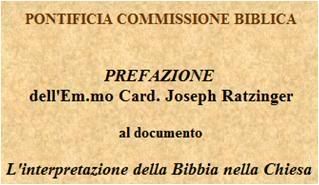 www.vatican.va/roman_curia/congregations/cfaith/pcb_documents/rc_con_cfaith_doc_19930921_interpretazione_prefazione...
www.vatican.va/roman_curia/congregations/cfaith/pcb_documents/rc_con_cfaith_doc_19930921_interpretazione_prefazione...
The study of the Bible is the spirit of theology, according to the Second Vatican Council (Dei Verbum 24), echoing a statement of Pope Leo XIII.
Such a study is never over. Every age should, in its own way, try to understand the Sacred Books. In the history of Biblical interpretation, the historico-critical method marked the start of a new era.
Thanks to this method, new possibilities arose to understand Biblical text in its original sense. Like any human reality, this method brings, along with its positive possibilities, some hidden dangers.
The search for 'original meaning' can lead to confining the Word exclusively to the past, so that its present relevance is no longer perceived.
The outcome can be that only the human dimension of the Word appears real. Its true author, God, eludes the grasp of a method which was elaborated only in the light of human understanding. The application to the Bible of a 'profane' method is necessarily subject to question.
Everything that helps to better find the truth and to discipline one's own ideas offers a valid contribution to theology. In this sense, it was right that the historico-critical method was accepted in theological work.
But everything that restricts our horizon and keeps us from bringing our attention and our hearing beyond what is merely human must be rejected in order to maintain an open horizon.
Therefore the emergence of the historico-critical method soon aroused a debate about its utility and its right configuration, a debate that has by no means ended.
In this debate, the Magisterium of the Catholic Church has taken a stand more than once in some important documents.
In the first place, Pope Leo XIII set some directives for the orientation of exegesis in his encyclical Providentissimus Deus of November 18, 1893. At a time when liberalism was manifesting itself to be extremely self-assured and even dogmatic, Leo XIII expressed several criticisms without excluding the positive aspect of the new possibilities.
Fifty years later, thanks to the fruitful work of great Catholic exegetes, Pope Pius XII could give more encouragement, inviting theologians, through his encyclical Divino afflante Spiritu of September 30, 1943, to avail of contemporary methods to better understand the Bible.
The Constitution of the Second Vatican Council on Divine Revelation, Dei Verbum, dated November 18, 1965, puts this altogether, unites the lasting perspectives of Patristic theology with the new modern methodologies, and gives us a synthesis which remains authoritative.
Meanwhile, the methodological range of exegetical studies has been amplified in a way that was not foreseeable 30 years ago. New methods and approaches have been proposed, from structuralism to an exegesis that is materialist, psycho-analytical and liberationist.
Similarly, new attempts are being made on the other side with the goal of gaining from the new use of Patristic methods of exegesis and to propose new forms of spiritual interpretation of Scriptures.
Thus, the Pontifical Biblical Commission undertook the task - 100 years after Providentissimus Deus, and 50 years after Divino afflante Spiritu - to define the Catholic position on exegesis in the present situation.
In its new conformation following Vatican-II, the Pontifical Biblical Commission is not an organ of the Magisterium, but rather, a commission of experts who, aware of their scientific and ecclesial responsibilities as Catholic exegetes, take positions on essential questions about the interpretation of Scripture, know ingthat they have the trust of the Magisterium in doing this.
That is how this document was drawn up and elaborated. It presents an overview, well-established, of the panorama of present methods and offers, to those who want it, orientation on the possibilities and limitations of these methods.
With this background, the document considers the question of the sense of Scripture: in what way is it possible to recognize this meaning, in the compenetration of human words with the divine Word, the singularity of a historical event and the constant validity of the eternal Word which is contemporary to every age?
Biblical text has its origin in a real past, but not only in the past - also from God's eternity. It leads us to God's eternity, passing through time which includes past, present and future.
I think that the document will bring valuable help to clarify the question of the right way towards understanding Sacred Scripture, while opening up new perspectives. It proceeds along the line of the encyclicals of 1893 and 1943, and extends it in a very fertile manner.
I wish to express my gratitude to the members of the Biblical Commission for their patient and often arduous work, with which this text gradually came to being.
I wish the document will be widely disseminated so that it may effectively contribute to the search for a more profound comprehension of the Word of God in Sacred Scripture.
Rome
Feast of St. Matthew Evangelist, 1993
+ JOSEPH Cardinal RATZINGER
P.S. The entire document can be seen on
catholic-resources.org/ChurchDocs/PBC_Interp.htm
The other document is "The Jewish People and its Scriptures in the Christian Bible" which is available in English on
www.vatican.va/roman_curia/congregations/cfaith/pcb_documents/rc_con_cfaith_doc_20020212_popolo-ebraico...
Here is Cardinal Ratzinger's Preface to the document.
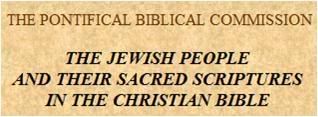 PREFACE
PREFACE
by Cardinal JOSEPH RATZINGER
The internal unity of the Church's Bible, which comprises the Old and New Testaments, was a central theme in the theology of the Church Fathers.
That it was far from being a theoretical problem only is evident from dipping, so to speak, into the spiritual journey of one of the greatest teachers of Christendom, Saint Augustine of Hippo.
In 373, the 19-year-old Augustine already had his first decisive experience of conversion. His reading of one of the works of Cicero — Hortensius, since lost — brought about a profound transformation which he himself described later on as follows: “Towards you, O Lord, it directed my prayers... I began to pick myself up to return to you... How ardent I was, O my God, to let go of the earthly and take wing back to you” (Conf. III, 4, 81).
For the young African who, as a child, had received the salt that made him a catechumen, it was clear that conversion to God entailed attachment to Christ; apart from Christ, he could not truly find God.
So he went from Cicero to the Bible and experienced a terrible disappointment: in the exacting legal prescriptions of the Old Testament, in its complex and, at times, brutal narratives, he failed to find that Wisdom towards which he wanted to travel.
In the course of his search, he encountered certain people who proclaimed a new spiritual Christianity, one which understood the Old Testament as spiritually deficient and repugnant; a Christianity in which Christ had no need of the witness of the Hebrew prophets.
Those people promised him a Christianity of pure and simple reason, a Christianity in which Christ was the great illuminator, leading human beings to true self-knowledge. These were the Manicheans.1
The great promise of the Manicheans proved illusory, but the problem remained unresolved for all that. Augustine was unable to convert to the Christianity of the Catholic Church until he had learned, through Ambrose, an interpretation of the Old Testament that made transparent the relationship of Israel's Bible to Christ and thus revealed that Wisdom for which he searched.
What was overcome was not only the exterior obstacle of an unsatisfactory literary form of the Old Latin Bible, but above all the interior obstacle of a book that was no longer just a document of the religious history of a particular people, with all its strayings and mistakes.
It revealed instead a Wisdom addressed to all which came from God. Through the transparency of Israel's long, slow historical journey, that reading of Israel's Bible identified Christ, the Word, eternal Wisdom.
It was, therefore, of fundamental importance not only for Augustine's decision of faith; it was and is the basis for the faith decision of the Church as a whole.
But is all this true? Is it also demonstrable and tenable still today? From the viewpoint of historical-critical exegesis, it seems — at first glance, in any case — that exactly the opposite is true.
It was in 1920 that the well-known liberal theologian Adolf Harnack formulated the following thesis: “The rejection of the Old Testament in the second century [an allusion to Marcion] was an error which the great Church was right in resisting; holding on to it in the 16th century was a disaster from which the Reformation has not yet been able to extricate itself; but to maintain it since the 19th century in Protestantism as a canonical document equal in value to the New Testament, that is the result of religious and ecclesial paralysis”.2
Is Harnack right? At first glance several things seem to point in that direction. The exegetical method of Ambrose did indeed open the way to the Church for Augustine, and in its basic orientation — allowing, of course, for a considerable measure of variance in the details — became the foundation of Augustine's faith in the biblical word of God, consisting of two parts, and nevertheless composing a unity.
But it is still possible to make the following objection: Ambrose had learned this exegesis from the school of Origen, who had been the first to develop its methodology.
But Origen, it may be said, only applied to the Bible the allegorical method of interpretation which was practised in the Greek world, to explain the religious texts of antiquity — in particular, Homer — and not only produced a hellenization intrinsically foreign to the biblical word, but used a method that was unreliable, because, in the last analysis, it tried to preserve as something sacred what was, in fact, only a witness to a moribund culture.
Yet, it is not that simple. Much more than the Greek exegesis of Homer, Origen could build on the Old Testament interpretation which was born in a Jewish milieu, especially in Alexandria, beginning with Philo who sought in a totally appropriate way to introduce the Bible to Greeks who were long in search of the one biblical God beyond polytheism.
And Origen had studied at the feet of the rabbis. He eventually developed specifically Christian principles: the internal unity of the Bible as a rule of interpretation, Christ as the meeting point of all the Old Testament pathways.3
In whatever way one judges the detailed exegesis of Origen and Ambrose, its deepest basis was neither Hellenistic allegory, nor Philo nor rabbinic methods. Strictly speaking, — leaving aside the details of interpretation — its basis was the New Testament itself.
Jesus of Nazareth claimed to be the true heir to the Old Testament — “the Scriptures” — and to offer a true interpretation, which, admittedly, was not that of the schools, but came from the authority of the Author himself: “He taught them as one having authority, and not as the scribes” (Mk 1:22).
The Emmaus narrative also expresses this claim: “Beginning with Moses and all the prophets, he interpreted to them the things about himself in all the Scriptures” (Lk 24:27).
The New Testament authors sought to ground this claim in details, in particular Matthew, but Paul as well, by using rabbinic methods of interpretation to show that the scribal interpretation led to Christ as the key to the “Scriptures”.
For the authors and founders of the New Testament, the Old Testament was simply “the Scriptures”: it was only later that the developing Church gradually formed a New Testament canon which was also Sacred Scripture, but in the sense that it still presupposed Israel's Bible to be such - the Bible read by the apostles and their disciples, and now called the Old Testament, which provided the interpretative key.
From this viewpoint, the Fathers of the Church created nothing new when they gave a Christological interpretation to the Old Testament; they only developed and systematised what they themselves had already discovered in the New Testament.
This fundamental synthesis for the Christian faith would become problematic when historical consciousness developed rules of interpretation that made Patristic exegesis appear non-historical and therefore, objectively indefensible.
In the context of humanism, with its new-found historical awareness, but especially in the context of his doctrine of justification, Luther invented a new formula relating the two parts of the Christian Bible, one no longer based on the internal harmony of the Old and New Testaments, but on their essential dialectic linkage within an existential history of salvation, the antithesis between Law and Gospel.
Bultmann modernised this approach when he said that the Old Testament is fulfilled in Christ by foundering. More radical is the proposition of Harnack mentioned above; as far as I can see, it was not generally accepted, but it was completely logical for an exegesis for which texts from the past could have no meaning other than that intended by the authors in their historical context.
That the biblical authors in the centuries before Christ, writing in the Old Testament, intended to refer in advance to Christ and New Testament faith, seems highly unlkiely \ to the modern historical consciousness.
As a result, the triumph of historical-critical exegesis seemed to sound the death-knell for the Christian interpretation of the Old Testament initiated by the New Testament itself. It is not a question here of historical details, as we have seen, it is the very foundations of Christianity that are being questioned.
It is understandable then that nobody has since embraced Harnack's position and made the definitive break with the Old Testament that Marcion prematurely wished to accomplish. What would have remained, our New Testament, would itself be devoid of meaning.
The Document of the Pontifical Biblical Commission introduced by this Preface declares: “Without the Old Testament, the New Testament would be an unintelligible book, a plant deprived of its roots and destined to dry up and wither” (no. 84).
From this perspective, one can appreciate the enormous task the Pontifical Biblical Commission set for itself in deciding to tackle the theme of the relationship between the Old and New Testaments.
If the impasse presented by Harnack is to be overcome, the very concept of an interpretation of historical texts must be broadened and deepened enough to be tenable in today's liberal climate, and capable of application, especially to Biblical texts received in faith as the Word of God.
Important contributions have been made in this direction over recent decades. The Pontifical Biblical Commission made its own contribution in the Document published in 1993 on “The Interpretation of the Bible in the Church”.
The recognition of the multidimensional nature of human language, not staying fixed to a particular moment in history, but having a hold on the future, is an aid that permits a greater understanding of how the Word of God can avail of the human word to confer on a history in progress a meaning that surpasses the present moment and yet brings out, precisely in this way, the unity of the whole.
Beginning from that Document, and mindful of methodology, the Biblical Commission examined the relationship between the many great thematic threads of both Testaments, and was able to conclude that the Christian hermeneutic of the Old Testament, admittedly very different from that of Judaism, “corresponds nevertheless to a potentiality of meaning effectively present in the texts” (no. 64).
This is a conclusion, which seems to me to be of great importance for the pursuit of dialogue, but above all, for grounding the Christian faith.
In its work, the Biblical Commission could not ignore the contemporary context, where the shock of the Shoah has put the whole question under a new light.
Two main problems are posed: Can Christians, after all that has happened, still claim in good conscience to be the legitimate heirs of Israel's Bible? Have they the right to propose a Christian interpretation of this Bible, or should they not instead, respectfully and humbly, renounce any claim that, in the light of what has happened, must look like a usurpation?
The second question follows from the first: In its presentation of the Jews and the Jewish people, has not the New Testament itself contributed to creating a hostility towards the Jewish people that provided a support for the ideology of those who wished to destroy Israel?
The Commission set about addressing those two questions. It is clear that a Christian rejection of the Old Testament would not only put an end to Christianity itself as indicated above, but, in addition, would prevent the fostering of positive relations between Christians and Jews, precisely because they would lack common ground.
In the light of what has happened, what ought to emerge now is a new respect for the Jewish interpretation of the Old Testament.[Here then is the specific rationale for why the Holy Father invited Rabbi Cohen to address the Synod, and the very topic he was asked to discuss.]
On this subject, the Document says two things. First it declares that “the Jewish reading of the Bible is a possible one, in continuity with the Jewish Scriptures of the Second Temple period, a reading analogous to the Christian reading, which developed in parallel fashion” (no. 22).
It adds that Christians can learn a great deal from a Jewish exegesis practised for more than 2000 years; in return, Christians may hope that Jews can profit from Christian exegetical research (ibid.). I think this analysis will prove useful for the pursuit of Judeo-Christian dialogue, as well as for the interior formation of Christian consciousness.
The question of how Jews are presented in the New Testament is dealt with in the second part of the Document; the “anti-Jewish” texts there are methodically analysed for an understanding of them. Here, I want only to underline an aspect which seems to me to be particularly important.
The Document shows that the reproofs addressed to Jews in the New Testament are neither more frequent nor more virulent than the accusations against Israel in the Law and the Prophets, at the heart of the Old Testament itself (no. 87).
They belong to the prophetic language of the Old Testament and are, therefore, to be interpreted in the same way as the prophetic messages: they warn against contemporary aberrations, but they are essentially of a temporary nature and always open to new possibilities of salvation.
To the members of the Biblical Commission, I wish to express gratitude and appreciation for their work. From their discussions, patiently pursued over several years, this Document has emerged which, I am convinced, can offer a precious aid to the study of one of the central questions of the Christian faith, as well as to the search so important for a new understanding between Christians and Jews.
Rome
Feast of the Ascension 2001
+ JOSEPH Cardinal RATZINGER
The following site
www.christendom-awake.org/pages/ratzinger/biblical-crisis.htm
has the complete text of the lecture given by Cardinal Ratzinger at St. Peter's Church in New York city in January 1988 on
"Biblical Interpretation in Crisis:
On the Question of the Foundations
and Approaches of Exegesis Today"
I will also post it in IN HIS OWN WORDS for convenience.
[Modificato da TERESA BENEDETTA 08/02/2009 04:20] |
|
 05/10/2008 01:44 05/10/2008 01:44 |
|
| | | OFFLINE | | Post: 15.202 | Registrato il: 28/08/2005
| Utente Gold | |
|
 The Pope confronts Church difficulty
The Pope confronts Church difficulty
in forbidding artificial contraception
by Luigi Accattoli
Translated from

Oct. 4, 2008
VATICAN CITY - For the second time in four months, the theologian Pope has referred to the 'difficulties' that the Catholic Church has encountered in its condemnation of articial contraception dating back to the encyclical Humanae Vitae of Paul VI in 1968.
He did in May and again yesterday, on both occasions addressing (in speech and writing) international conferences that have been organized in Rome to mark the 40th anniversary of the encyclical.
Papa Ratzinger rarely speaks about sexuality. As a cardinal, he had noted that men of the Church "have spoken too much and too often" about it in negative terms.
But yesterday, as he did in May, he defended the encyclical all the way, affirming as Paul VI did that spouses should practice conjugal love that is "always open to life", thus resorting only to 'natural methods' - that is, abstinence during the fertile days of the woman's cycle - to 'space out' pregnancies.
In May, he said that the 'not easy' teaching handed down by Paul VI was 'a sign of contradiction' in today's world and is often 'misunderstood'.
"We can ask how is it that in the world today, even so many faithful find it so difficult to understand the message of the Church, which illustrates and defends the beauty of conjugal love in its natural manifestation", he said in a written message yesterday to a conference at the Catholic University of Rome.
"Certainly", he noted," the technological solution even in the great human questions often seems to be the easiest...(but) technology cnanot replace the maturation of freedom when love is in play".
He goes on to say that Church doctrine is based on the 'intimate truth' of matrimony, a truth which can taught "by orienting couples to understand with the heart the wonderful design that God has isncribed in the human body".
"To understand with the heart" because "not even reason suffices (and) only the eyes of the heart can grasp the demands of a great love that is capable of embracing the totality of the human being."
Knowing full well that numerous Catholic theologians and intellectuals consider the Church view of human love excessively rigorous - there was an international manifesto carried in newspaper advertisements last June by dissenters demanding a change in position - the Pope affirmed that "conjugal love has its own way of communicating itself: by generating children."
The papal message drew consensus from Catholics [Really???] and the usual protets from secularists. The Italian Society of Gynecologists said "Natural methods of birth control do not have the same guarantee as hormonal contraceptives".
But the Undersecretary for Welfare Eugenia Rocella called on laymen to 're-think' the 'detachment of sexuality from procreation'.
Franco Grillini, president of the Italian gay association Arcigay , said "condoms represent the only protection against sexually-transmitted disease". [ He's no doctor - and no, they are not. What about abstinence when there is a known risk?]
I feel very strongly about this issue. I think, perhaps, most priests around the world simply gave up too easily to advocates of the pill - and therefore opponents of Church doctrine and Humanae vitae - and have really done little or nothing in the past 40 years to school the faithful in the alternative of natural birth control, which could be presented as an act of sacrifice - the old-fashioned and virtuous practice of self-mortification, if you will - that a couple should not begrudge offering for a few days each month.
Whatever happened to the practice of voluntarily giving up something pleasurable for a time as an act of penance or offering in behalf of others? When even the fairly simple and harmless Church 'commandment' to abstain from meat on Fridays and during Lent was discarded?
The use of the contraceptive pill, like abortion, is defended by its advocates as a woman's exercise of her rights over her own body. That's a legalistic euphemism for 'doing as one pleases however one pleases', the culture of instant gratification, of hedonism, pleasure no matter what, when, where and how.
But any serious religion is also a discipline. I think perhaps religious instruction has lost that sense of discipline - which also implies responsibility for oneself and for other people we may affect.
If trendy New Age people can teach themselves to stop eating meat overnight (or other similarly restrictive dicta of New Age 'religions' and 'spiritual training'), is that not more difficult than just abstaining - or chanelling/sublimating one's sexual impulses in other activities - during your fertile days?
[Modificato da TERESA BENEDETTA 05/10/2008 01:46] |
 05/10/2008 02:21 05/10/2008 02:21 |
|
| | | OFFLINE | | Post: 15.203 | Registrato il: 28/08/2005
| Utente Gold | |
|
 Bishops' assembly
Bishops' assembly
under the sign of dialog
Translated from

Oct. 4, 1008
VATICAN CITY - The Bible as the common terrain for dialog among Catholics, Orthodox Christians and Jews. This is the sense that Pope Benedict XVI appears to have given to the XII General Assembly of the Bishops' Synod on the "The Word of God in the life and mission of the Church".
The Synod opens tomorrow with a number of innovations, as its secretary-general Mons. Nicola Eterovic of Croatia, explained in a press briefing yesterday.
The first, of course, is that the opening Mass will not be held at St. Peter's Basilica but at the Basilica of St Paul outside the Walls, starting at 9:30 Sunday morning. This is a tribute to the Apostle of the Gentiles during the Pauline Year marking two millennia since his birth.
The second novelty is truly amazing. for the first time, a Jewish rabbi will be addressing the Synod. On Tuesday afternoon, Rabbi Shear Yashuv Cohen of Haifa (Israel) will discuss how Jews read and interpret their Sacred Scriptures, in large part adopted by Christians as the Old Testament of the Bible.
Similarly, the Ecumenical Patriarch of Constantinople has been invited by Pope Benedict to the Synod. On Saturday afternoon, Patriarch Bartholomew I will concelebrate Vespers with the Pope and will then address the Synod on the Word of God as it relates to the celebration of the Pauline Year.
It will also be the first time that an Orthodox Patriarch will address the Synod. [I think this is as big a story as Rabbi Cohen's participation, but why was it not reported earlier? And not getting the attention it deserves? The bigger headline, of course, is that for the first time, Pope Benedict has opened the Bishops' Synod to non-Catholic speakers. Brother Alois of Taize and a representative of the evangelical churches will also address this Synod.]
A few important Papal events will also take place during the Synodal Assembly.
On Thursday, Oct. 9, Benedict XVI will preside at a concelebrated Mass in St. Peter's basilica to mark the 50th anniversary of the death of Pope Pius XII, who had a significant influence in the Biblical field, because through various documents, he was responsible for relaunching Bible studies in seminaries, Catholic faculties and pontifical universities.
On Sunday, Oct. 12, the Pope will preside at a canonization Mass for four new saints "distinguished by their prayerful listening to the Word of God and putting it into practice".
The new saints are Neapolitan priest Gaetano Errico (1791-1860); the Swiss nun Maria Bernarda Buetler (1848-1924); the first native-born Indian saint, Sr. Alfonsa of the Immaculate Conception (Anna Muttathupadath, 1910-1946); and an Ecuadorian laywoman Narcisa Martillo Moran (1832-1869).
On Sunday, Oct. 19, the Pope will visit the Shrine of Our Lady of the Rosary in Pompeii. (October is the month of the Rosary).
[Modificato da TERESA BENEDETTA 05/10/2008 03:50] |
 05/10/2008 11:01 05/10/2008 11:01 |
|
| | | OFFLINE | | Post: 15.207 | Registrato il: 28/08/2005
| Utente Gold | |
|
 A common responsibility
A common responsibility
for Church and State
by Francesco M. Valiante
Translated from
the 10/5/08 issue of

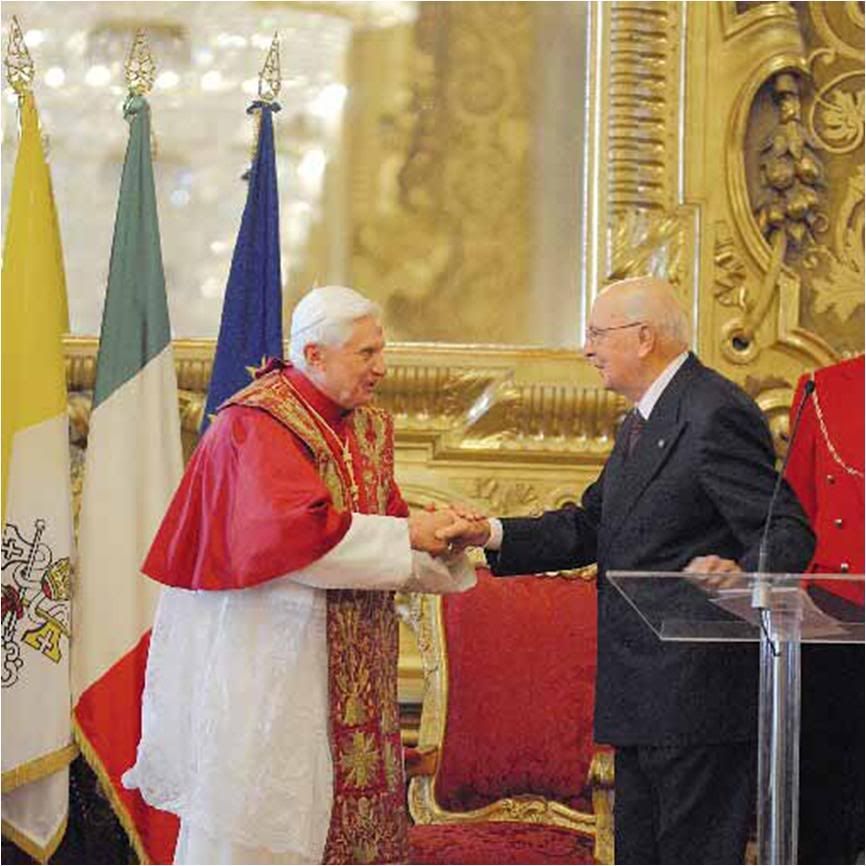
At the Quirinale, the Pope feels he is in 'the symbolic house for all Italians'.
From the place which, after almost three centuries as the residence of the Popes, became a 'sign of contradiction' between the Church and the nascent unified Italian state, Benedict XVI today sees a much narrower Tiber.
Two of Rome's seven hills - the Vatican and the Quirinal - that no longer "ignore each other or confront each other with rancor", but "co-exist peacefully and collaborate fruitfully" in the service of the human being and social coexistence.
As President Napolitano confirmed, speaking of 'a relationship of reciprocal respect and fecund collaboration'. Which, he underscores, "does not in in any way obfuscate the distinction between the political and the religious'.
The Pope's visit to the President of the Italian Republic, on the day of St. Francis of Assisi, returns the visit made by the President to the Vatican on November 20, 2006.
But it was no act of mere institutional courtesy. The relaxed protocol, the accent on dialog and collaboration, the informal cordiality of gestures gave the meeting 'a value far more profound and symbolic', as Benedict XVI would point out in his speech.
The Italian President said that 'full adherence to the values of the (Italian) Constitution' that characterizes institutional activity does not exclude - but on the contrary, implies - a natural syntony with the Magisterium of the Church.
With particular attention to situations of injustice and social inequality, to the continual outbreak of hostilities in regions particularly prone to war and its attendant sufferings, to human dignity trampled on 'in all its forms and in all places' - and the lack of brotherly solidarity, above all in delicate and complex questions like that of immigrants - all of which call into question "the responsibilities and choices of governments".
The 'syntony' between the Pope and the President was evident, substantial, especially on the question of the 'educative emergency' - an undertaking towards 'the construction of a fraternal society truly animated by a sense of legality', as the Pope defined it, while the President referred to 'our common responsibility' to repair the 'damages from a corrosive collapse of ethics in economy and politics'.
There were other points of agreement - from young people and unemployment, to the needs of families and older people; from poverty and emargination, to how immigrants should be received.
Pope Benedict expressed his particular concern that religious freedom be protected to allow believers 'to do their part in the construction of the social order'.
Napolitano recalled with concern the danger of racism and reiterated that 'nothing can justify racial contempt and discrimination'.
There was no confusion nor opposition in their words. Secularity is something acquired. The Pontiff expressly reassured those who fear 'a prevarication that would damage freedom on the part of the Church and its members'.
In Italy - 'historically permeated with the ideal legacy and living presence of Christianity', the President acknowledged, a community whose only purpose is to 'serve man' cannot raise fear. And so he asked that the contribution of the Church 'be welcomed by all in the same spirit of willingness with which it is offered'.
If only because, he continued, "the sense of secularity of the State, which can be grasped from what the Constitution provides, embraces the acknowledgment of the social and political dimension of the religious fact".
As such, secularity implies 'not just respect for the search that moves the universe of the believer, but dialog', one founded on 'the non-dogmatic exercise of reason' and on its 'natural characteristic of self-questioning and openness'. Which is exactly the logic and thread that runs through the Ratzinger Pontificate.
The Vatican and the Quirinal:
Two hills very close to each other
Editorial by
Giovanni Maria Vian
Translated from
the 10/5/08 issue of

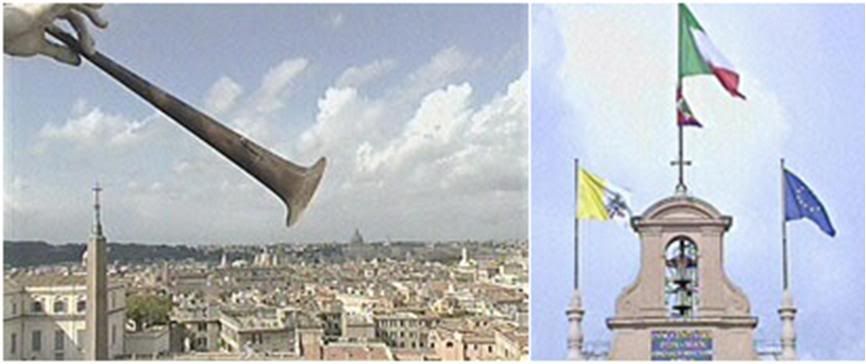 Left, View from the Quirinal shows St. Peter's in the background; right, Vatican flag flying from a 'belltower' of what was once the residence of the Popes.
Left, View from the Quirinal shows St. Peter's in the background; right, Vatican flag flying from a 'belltower' of what was once the residence of the Popes.
The Quirinal and the Vatican not only look at each other in friendship, but express, in symbols and facts, a growing collaboration for the good of everyone and the dignity of every human being.
In Italy and the European context, but with a dynamic that can be exemplary even for other nations.
As two very significant anniversaries approach - the 80th of the Lateran Pacts of 1929 and the 105th of Italian unification (1861) - the encounter between the Pope and the President of the Italian Republic thus takes on an indisputable significance and must be welcomed as a truly important stage in the development of relations between Italy and the Holy See, which have been excellent.
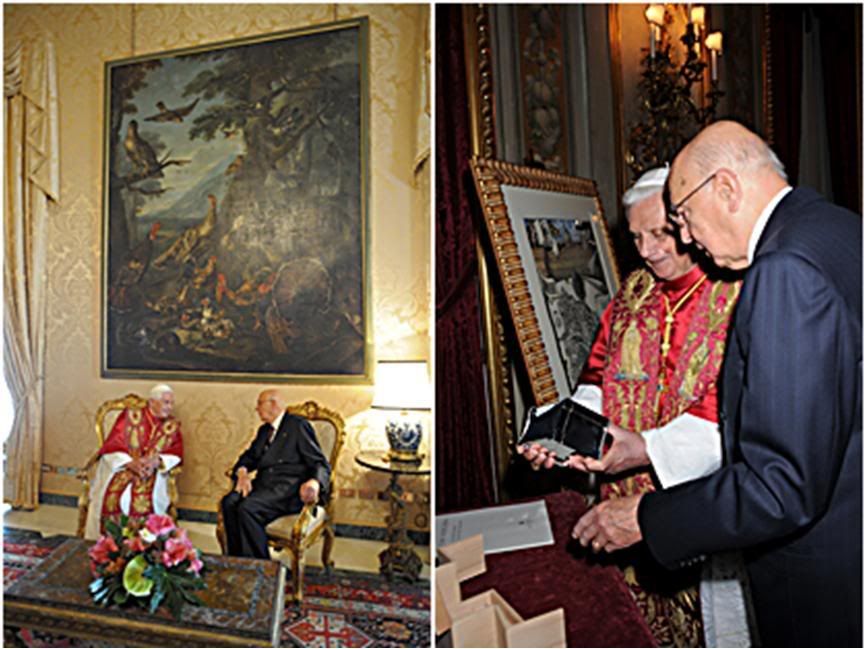
Doubtless thanks to the personalities of Benedict XVI and Giorgio Napolitano; to the cordiality that marks the personal relationship between the Bishop of Rome and the head of the Italian state; to the multiple areas of institutional cooperation; and finally, to the daily commitment of numberless men and women, believers and not, who share citizenship in constitutional loyalty to that nation of which the Roman Pontiff is the Primate.
Like the two hills that face each other, the addresses of the President and the Pope almost mirrored each other.
Thus Napolitano underscored, with attentive exalted words, the reciprocal respect and collaboration between the Italian Republic and the Catholic Church, attention for the teaching of Benedict XVI, the ideal legacy and living presence of Christianity in Italy, the shared principles of justice, the need to consolidate peace and to affirm solidarity in Europe in the face of global phenomena such as that of migration and a rebirth of racism, attention to the educative dimension in the face of the ethical disorientation in the world of economy and politics, and finally, the acknowledgment - in Italian history and in the Constitution of the republic - of the social and public dimension of the religious fact, to which he adds that of the contribution of Catholics to the life of the nation.
Visiting the Quirinale - the papal residence for centuries, from which two Popes were forcibly taken away - Benedict XVI called it 'a sign of contradiction' that had been overcome by the Lateran Pacts, whereby the waves of the Tiber had carried out to the Tyrrhenian Sea the tides of the past, finally reuniting the two hills, in the image evoked by Pius XII on the tenth anniversary of the Pacts when, for the first time, a Roman Pontiff, came back to the hill that overlooks the Vatican.
And the reciprocal respect of the sovereignty of Church and State is a reality that can be verified in Italy every day. In the sign of St. Francis, recalled by Pius XI and John Paul II, which, according to Benedict XVI, well expresses the mission of the Catholic community in Italy.
Namely, a service to the human being which is its only purpose, so that there is no reason "to fear a prevarication that can damage freedom on the part of the Church and its members, who therefore expect that their freedom be recognized not to betray their own conscience illuminated by the Gospel".
Without any intentions of power or privileges. In order that Italy, as John XXIII once wished, may protect that 'sacred testament' which commits it before God and mankind.
Strange weather for the Pope's
trip across the Tiber
by ELISA PINNA
 One would not even have suspected it unless one was in Rome today or watching a broadcast of the Pope's visit to the Quirinale....
One would not even have suspected it unless one was in Rome today or watching a broadcast of the Pope's visit to the Quirinale....
Sun, rain, sun, rain. And finally a lightning bolt that violently struck the flag-flying Torrino over the Presidential palace, just a few minutes after Papa Ratzinger had left to return to the Vatican.
Unforeseen weather that was nasty at times marked the morning of Pope Benedict's visit to President Giorgio Napolitano. But that was the only flaw in an event that functioned to perfection and a morning marked by smiles all around and an almost family atmosphere.
The visit started at 11 a.m. on the dot, when the Pope's open-top limousine entered the courtyard of the Quirinale followed by two platoons of presidential guards on horseback.
Until a few minutes earlier, it had been drizzling. Now President Napolitano waited to greet the Pontiff at the entrance to the Vetrata (stained glass) Terrace.
They shook hands, then stood at attention as a military band played the Vatican and Italian anthems, with an honor guard of the Italian Marines and Aeronautics.
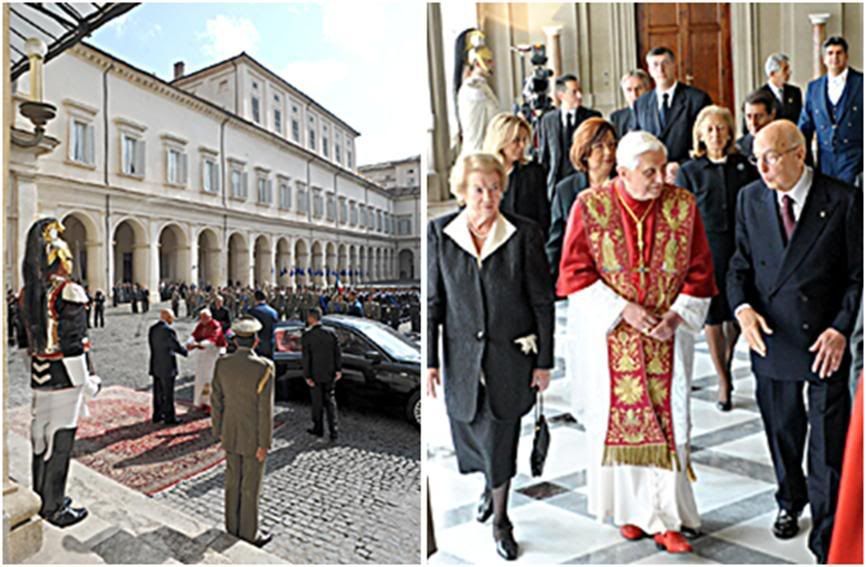
The program was planned to minimize time spent in protocol formalities in favor of more face time together. So while the Vatican flag was still being raised over the Torrino [which would be struck by lightning later), the President and the Pope were already greeting the official delegations waiting inside - with emeritus Presidents Oscar Scalfaro and Carlo Ciampi (missing was Francesco Cossiga, whom had lunch with the Pope in Bressanone last August), and Prime Minister Silvio Berlusconi who bent to kiss the Pope's ring.
After brief pleasantries, the President and the Pope proceeded to their private conversation. After about half an hour, they were joined by Napolitano's wife Clio.
In the Napoleonic Hall, Prime Minister Berlusconi and his foreign minister met with Cardinal Tarcisio Bertone and his two deputies, including Vatican 'foreign minister' Mons. Dominique Mamberti.
As he did when he first came to the Quirinale as Pope in 2005 (Ciampi was President), the Pope also asked to pray a few moments at the Chapel of the Annunziata.
It was after 12 noon when they proceeded to the Hall of Feasts - which used to be Consistory Hall when the Quirinale was the residence of the Popes.
The two heads of state delivered their addresses to a 'bipartisan' group of deputies and senators.
After that they exchanged gifts. The Pope gave the President a specially engraved map of 'Civitas Vaticana', while the President gave him a silver box depicting the gates of the Quirinal.
The Pope left shortly thereafter, seen off once more with military honors, and escorted in reverse back to the Vatican by the elite presidential guard.
The sun was shining, but a few minutes after the papal entourage left, down came a thunderstorm replete with thunder and lightning.
In the Pope's open-top car, the Pope's secretary held an umbrella over their heads just as they reached the Vatican.
I gave priority to translating the accounts in L'Osservatore Romano because I was aware that on Sunday, I would have to translate first the Pope's homily and Angelus message. However, there are a few excelent brief and postive reports in the Italian MSM that must be shared. I will trnslate them as time permits.
[Modificato da TERESA BENEDETTA 05/10/2008 19:03] |
 05/10/2008 11:35 05/10/2008 11:35 |
|
| | | OFFLINE | | Post: 15.209 | Registrato il: 28/08/2005
| Utente Gold | |
|

OR today.
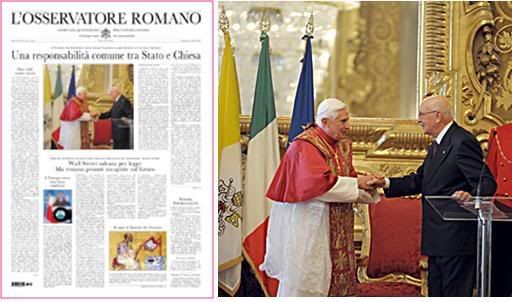
The President of Italy welcomes Benedict XVI to the Quirinal:
'A common responsibility for Church and State'
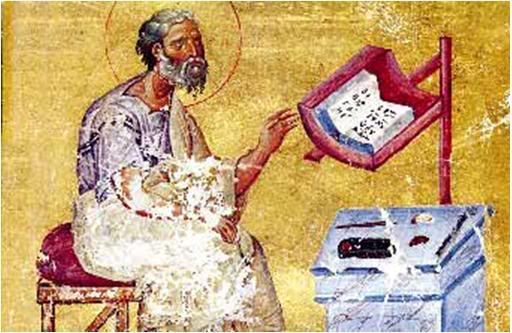 Other Page 1 stories: An editorial on relations between Italy and the Vatican; Wall street
Other Page 1 stories: An editorial on relations between Italy and the Vatican; Wall street
'rescued' by new law but great uncertainties remain; European Union seeks a common line
to cope with financial emergency; Bishops' Synod opens today (illustrated by woodcut above).
THE POPE'S DAY
- The Holy Father presided at Mass in the Basilica of St. Paul outside the Walls to open the XII General
Assembly of the Bishops Synod. Homily.
- Noontime Angelus.
- Tonight, around 7 p.m., Benedict XVI will lead off RAI's historic Bible-reading marathon.
[Modificato da TERESA BENEDETTA 12/10/2008 03:01] |
 05/10/2008 13:00 05/10/2008 13:00 |
|
| | | OFFLINE | | Post: 15.210 | Registrato il: 28/08/2005
| Utente Gold | |
|
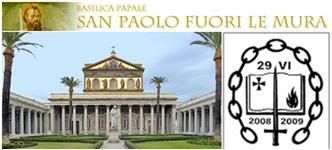  BISHOPS' SYNOD OPENS
BISHOPS' SYNOD OPENS
WITH CONCELEBRATED PAPAL MASS
I have posted a full translation of the Holy Father's homily in the post after this, as well as in the thread HOMILIES, DISCOURSES, MESSAGES.
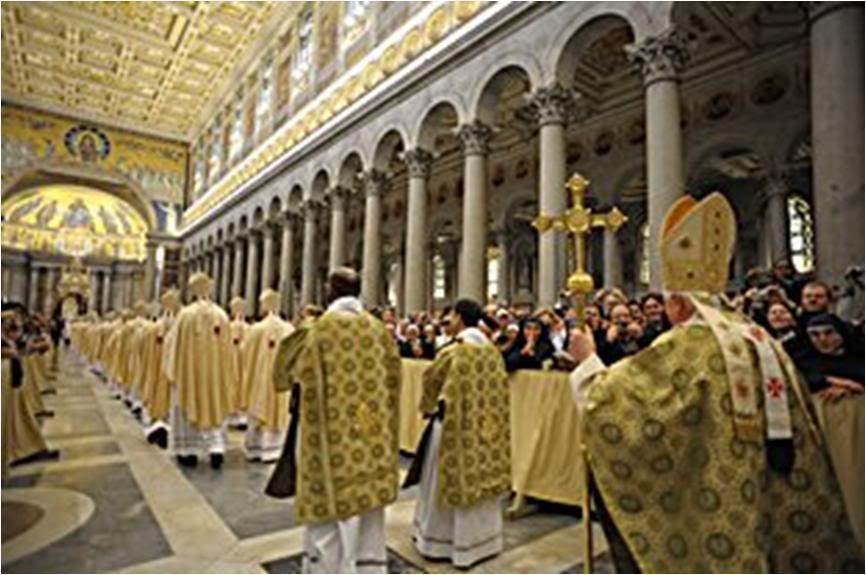
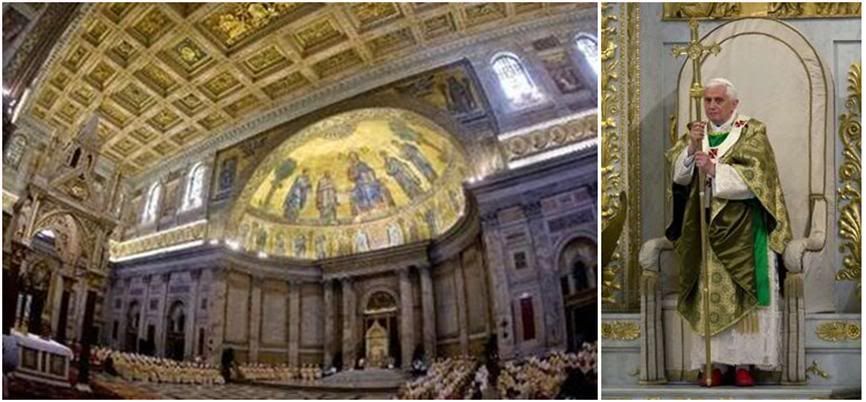
At 9:30 this morning, the 23rd Sunday in ordinary time, the Holy Father Benedict XVI presided at the Basilica of St. Paul outside the Walls over the concelebration of the Eucharist with the Synodal Fathers, on the occasion of the opening of the XII Ordinary General Assembly of the Synod of Bishops, which will take place at the Hall of Synods in the Vatican till October 26, on the theme Verbum Domini in vita et missione Ecclesiae (The Word of God in the life and mission of the Church).
Concelebrating with the Pope were the Synodal Fathers and their co-workers: 52 Cardinals, 14 members of the Oriental churches, 45 archbishops, 130 bishops and 85 priests (of which 12 are synodal Fathers, 5 officials of the General Secretariat, 30 auditors, 5 experts, 4 press aides, 23 assistants and 5 translators).
For the Eucharistic Prayers, the Holy Father was joined at the altar by the Delegate Presidents of the Assembly: Cardinal George Pell, Archbishop of Sydney; Cardinal William Joseph Levada, Prefect of the Congregation for the Doctrine of the Faith; Cardinal Odilo Pedro Scherer, Archbishop of Sao Paulo (Brazil); the moderator, Caridnal Marc Ouellet, P.S.S., Archbishop of Quebec (Canada); the Secretary-general, Mons. Nikola Eterović; and the Special Secretary, Mons. Laurent Monsengwo Pasinya, Archbishop of Kinshasa (Democratic Republic of the Congo).
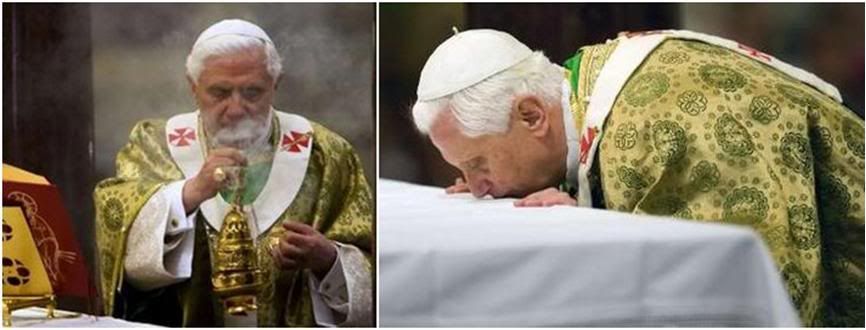
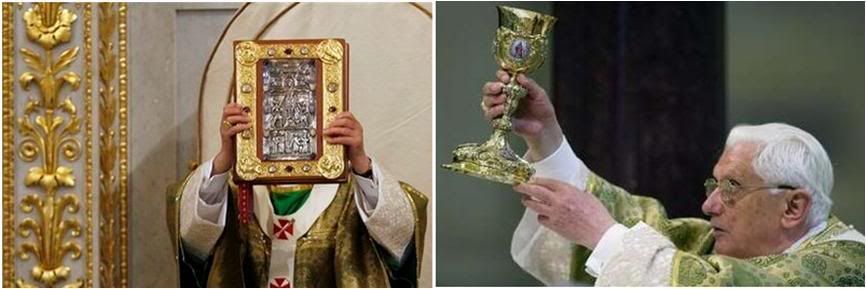 Pope opens Synod,
Pope opens Synod,
warns of modern godless societies
By Philip Pullella

ROME, Oct. 5 (Reuters) - Pope Benedict opened a major Vatican meeting on Sunday by decrying a modern culture so devoid of faith that some people were declaring God 'dead' and entire nations were losing their identity.
The 81-year-old German pope made his comments in the homily of a Mass opening a month-long synod of Roman Catholic bishops from around the world who will be discussing God's message through Scripture.
He said nations that were "once rich in faith" were now "losing their identity under the harmful and destructive influence of a certain modern culture."
Since his election in 2005 the Pope has been condemning a loss of Christian identity in most developed countries in Europe and has recently been speaking out about the need to re-inject moral values into Europe's political arena.
"There are those, who, after deciding that 'God is dead,' declare themselves to be 'god' and the artisan of their own destiny, the absolute master of the world," he said.
Attempts to "brush God aside" lead to arrogance of power, selfishness, injustice, exploitation and violence, he said at the Basilica of St Paul's in Rome.
"When men proclaim themselves to be absolute masters of themselves and sole masters of creation, can they truly build a society where freedom, justice and peace reign?," he said.
The synod, whose formal work begins on Monday, will be discussing scripture and will break new ground when Rabbi Shear-Yashuv Cohen becomes the first Jew to address such a Vatican gathering.
But it has been marred by Beijing's denial of permission for Catholic bishops to travel to Rome for the event.
China's communist government does not allow its Catholics to recognize the Pope's authority and forces them to be members of state-backed Catholic organization.
China's eight to 12 million Catholics are split between the officially approved Church and an "underground" one loyal to the Pope.
The lack of participation from China came as a surprise because there had been signs of improved relations this year.
A bishop from Hong Kong represented Pope Benedict at the opening ceremony of the Olympics in August and in May China's national orchestra played for the Pope at an unprecedented concert in the Vatican.
Benedict has made improving relations with China a main goal of his pontificate and hopes diplomatic ties can be restored.
China says that before restoring ties that were broken off two years after the 1949 Communist takeover, the Vatican must first sever relations with Taiwan, which Beijing considers a renegade province.
Bishops from Macao and Honk Kong, regions with a degree of autonomy from Beijing, will attend.
In an event related to the synod, the Pope will be the first of some 1,200 people to take part in a marathon non-stop reading of the Bible expected to last a week and be broadcast on Italian state television RAI.
The Pope will read from the book of Genesis. Rome's chief rabbi, Riccardo di Segni, had been expected to read immediately after the Pope but pulled out of the event last month, saying it had become "too Catholic."
All 73 books of the Catholic edition of the Bible will be read. Each speaker will read for about 5-8 minutes on live TV.
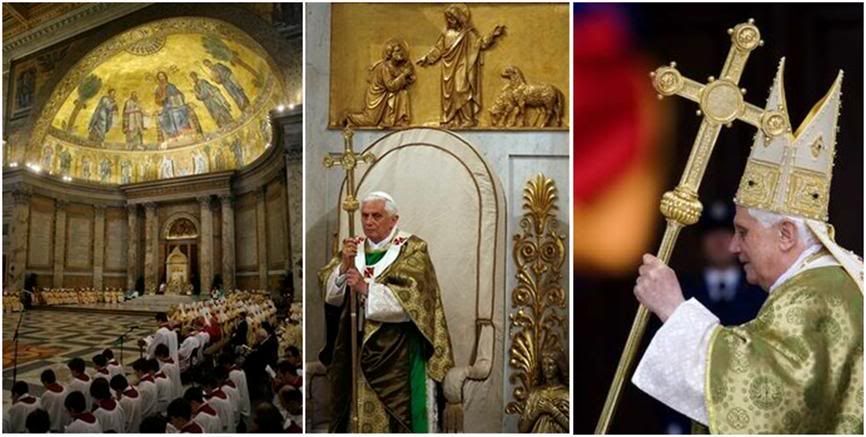
 Pope decries godless nature
Pope decries godless nature
of modern societies
By VICTOR L. SIMPSON

ROME, Oct. 5 (AP) - Pope Benedict XVI warned Sunday that modern culture is pushing God out of people's lives, causing nations once rich in religious faith to lose their identities.
Benedict celebrated a Mass in the Basilica of St. Paul Outside the Walls to open a worldwide meeting of bishops on the relevance of the Bible for contemporary Catholics.
"Today, nations once rich in faith and vocations are losing their own identity, under the harmful and destructive influence of a certain modern culture," said Benedict, who has been pushing for religion to be given more room in society.
The meeting of 253 bishops, known as a synod of bishops, will run from Monday through Oct. 26. The Vatican said that despite Benedict's efforts to improve relations with Communist China, no bishops have come from the mainland, although there are prelates from Macau and Hong Kong.
"Surely they tried, I mean the Holy See tried but obviously they could not make agreement," Hong Kong Cardinal Joseph Zen told AP Television News as he entered the basilica.
"Maybe the Holy See welcomes someone that they (the Chinese) would not allow," he said, adding that China might try to send a bishop who is not acceptable to the Holy See.
Chinese bishops have not been allowed to travel to similar meetings in the past.
Ties between the Vatican and China's communist government have long been strained. Beijing objects to the Vatican's tradition of having the pope name his own bishops, calling it interference in China.
China appoints bishops for the state-sanctioned Catholic church. In recent years, some of those bishops have received the Vatican's tacit approval.
Still, many of the country's estimated 12 million Catholics worship in congregations outside the state-approved church with bishops loyal to the Pope.
A document prepared for the meeting rejects a fundamentalist approach to the Bible and said a key challenge was to clarify for the faithful the relationship of scripture to science.
A rabbi will address the conference on Monday in what is believed to be the first time a Jew has participated in such a meeting. [It is!]
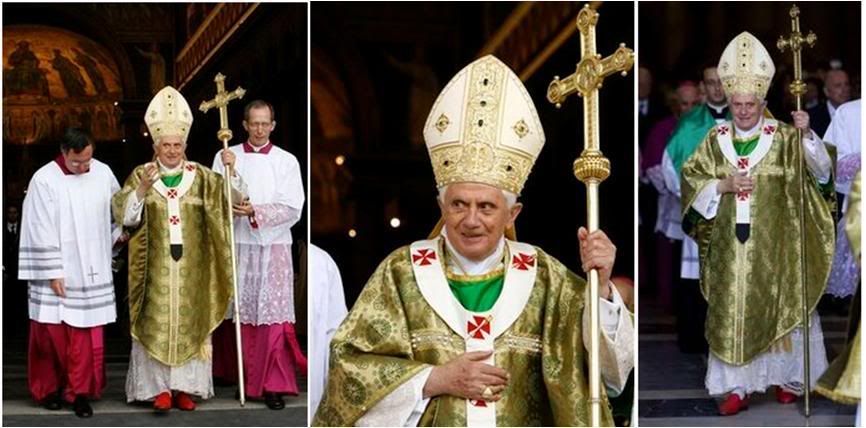
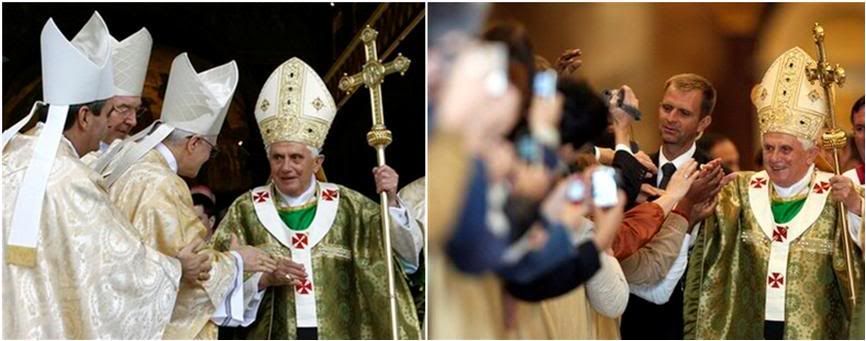
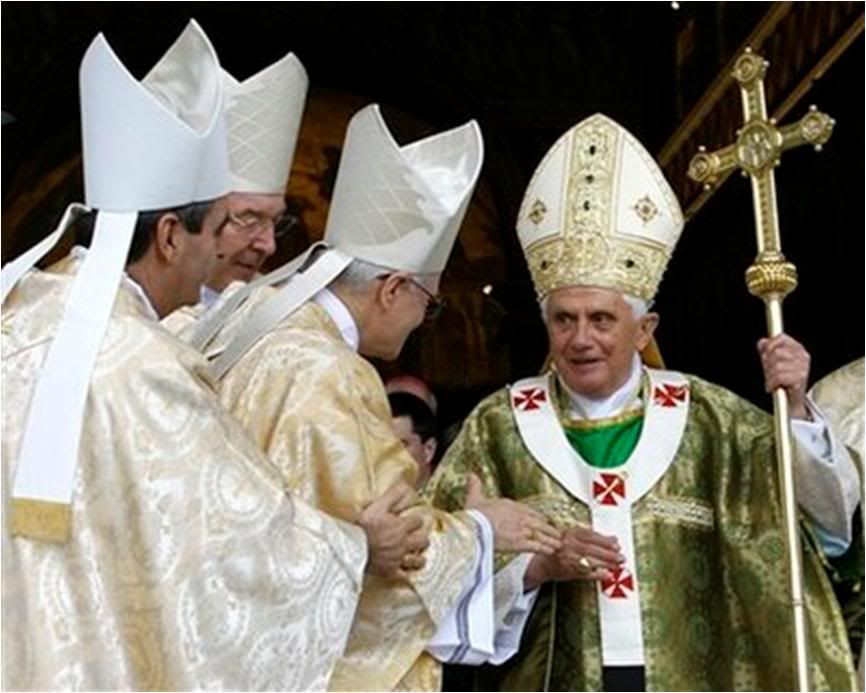 Benedict urges bishops
Benedict urges bishops
to think big
By JOHN L. ALLEN JR.
Rome

Oct. 5, 2008
Opening the Synod of Bishops on the Bible this morning, Pope Benedict XVI urged the bishops gathered in Rome for the next three weeks to think big -- asking them to ponder how the Bible can fuel renewal "from the family to schools, culture, work, free time and other sectors of society and our lives.”
The clear hint was that the Pope does not want this Synod to be primarily an inward-directed affair, concerned with the role of the Bible in internal Church affairs, but rather one with a much broader horizon.
The Pope also struck two key themes of his papacy: a just world is impossible without God, and the need for a renewal of Christianity’s missionary energies.
Pope Benedict XVI celebrated the opening Mass of the synod Sunday morning at the Basilica of St. Paul’s Outside the Walls, the first time the opening liturgy has been staged outside St. Peter’s Basilica. Benedict has designated 2008 as the Pauline Year in honor of St. Paul, the great missionary of early Christianity.
In his remarks to the congregation at St. Paul’s, which included 52 cardinals, 45 archbishops, and 108 bishops, Benedict warned against “the coldness and rebellion of incoherent Christians.”
“Nations which once were rich in faith and vocations are now losing their identity,” the Pope said, “under the deleterious and destructive influence of a certain modern culture.”
In that context, Benedict returned to a familiar theme: the false promises of a world without God.
“When humanity eliminates God from its horizon, declaring God ‘dead,’ does that really make people happier?” Benedict asked. “Does humanity become truly freer? When people proclaim themselves the absolute proprietors of themselves and the lone owners of creation, can they truly construct a society in which justice, freedom and peace reign?”
“Doesn’t the opposite actually happen, as the daily news amply demonstrates?” Benedict said, answering his own rhetorical question. “Doesn’t the rule of power, of egotistical interests, of injustice and exploitation, of violence in all of its expressions, simply spread even more?”
A world without God, Benedict warned, ends with people “more alone, and a divided and confused society.”
Despite the dire tone of those alarms, Benedict also offered a note of hope, saying that “if in some regions the faith is weakening to the point of extinction, there will always be other peoples ready to welcome it.”
As Pope, Benedict has repeatedly insisted that tension between proclaiming the gospel and working for social justice, which is often experienced at the Catholic grassroots, is a false choice.
Ultimately, he has argued, Christ is the only basis for lasting justice and peace, so that preaching the Gospel is a form of building a better world.
“Only the Word of God can change human hearts at the deepest level,” the Pope said this morning.
In that connection, Benedict focused on the link between the Bible and the missionary impulse in Christianity. He distinguished three groups that should be the object of missionary efforts:
• Those who have never heard the gospel;
• Those who have weakened in the faith, and preserve only a superficial contact with the Word of God;
• Those who have become distant from the faith and therefore require a “new evangelization.”
Emphasizing the importance of the Bible, Benedict quoted a famous adage of St. Jerome: “Ignorance of Scripture is ignorance of Christ.”
More broadly, Benedict urged that the synod develop new strategies to draw on the Bible to evangelize broad sectors of culture.
In remarks during his Angelus address, Benedict stressed the importance of the Synod of Bishops itself. He said it was designed to do four things:
• “Favor a close union and collaboration between the pope and the bishops of the world”;
• “Furnish direct and exact information regarding the circumstances and the problems of the church”;
• “Favor agreement on doctrine and pastoral action”;
• “Deal with themes of great importance today.”
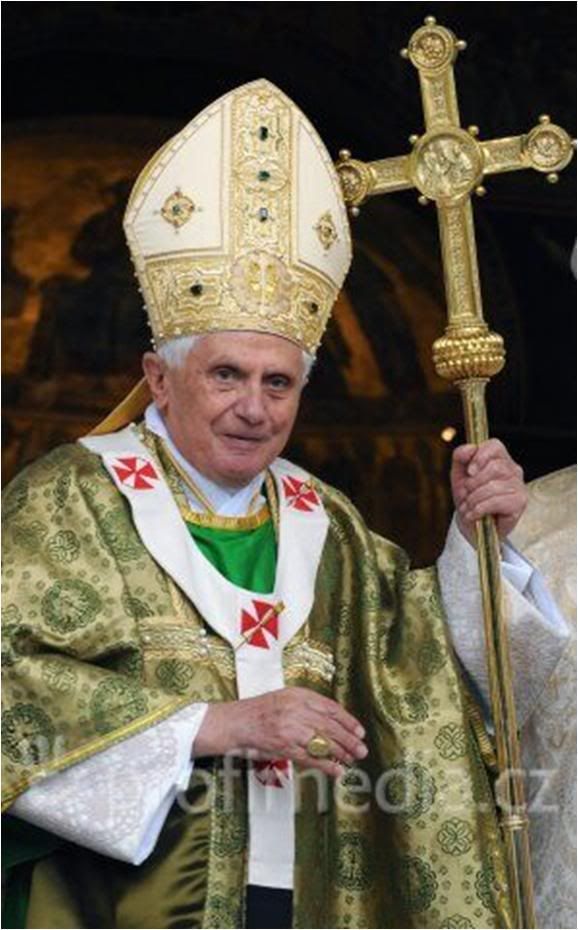
NB: It was a pleasant surprise to see the Holy Father wearing the chasuble in the style of St. Philip Neri
that the Diocese of Brindisi ordered made specially for him for his pastoral visit earlier this year. They had
commissioned the reproduction of the pattern on a medieval fabric that had been used as a reliquary. But
for some reason, he was not wearing its matching dalmatic. The bright green dalmatic is such a mismatch,
whereas the deacons did wear the right dalmatics.
Gregor Kollmorgen at NLM identifies the pattern on the concelebrants' cream chasubles as the coat
of arms of Paul VI. Perhaps they took them out of storage - the brocade is exquisite - as a tribute
to the Pope who first constituted the Bishops' Synod. .
[Modificato da TERESA BENEDETTA 06/10/2008 19:37] |
 05/10/2008 16:15 05/10/2008 16:15 |
|
| | | OFFLINE | | Post: 15.211 | Registrato il: 28/08/2005
| Utente Gold | |
|
  More pictures from today's Mass, courtesy of Caterina, with her prompt videocap montages. I will take advantage of the additional photos to post the full translation of his homily here, as well.
More pictures from today's Mass, courtesy of Caterina, with her prompt videocap montages. I will take advantage of the additional photos to post the full translation of his homily here, as well.
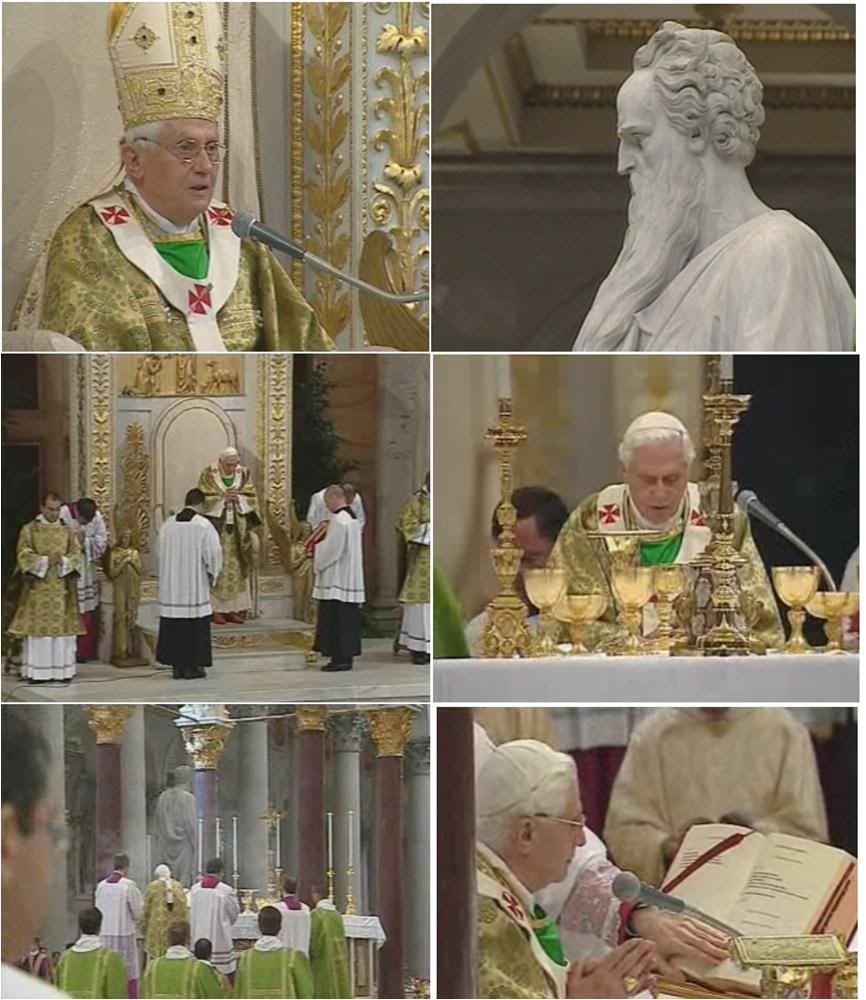
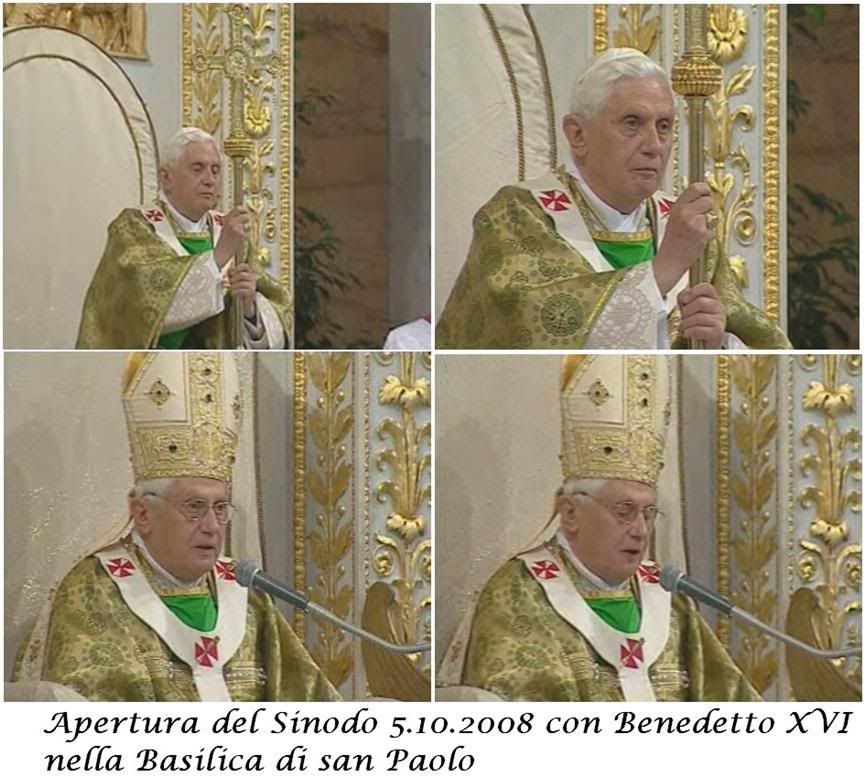
HOMILY ON 10/6/08
Opening Mass for the 12th General Assembly of the Bishops' Synod
Basilica of St. Paul outside the Walls
Venerated brothers in the Episcopate and Priesthood,
Dear brothers and sisters!
The first Reading, taken from the book of the prophet Isaiah, as well as the Gospel passage taken from Matthew, propose to our liturgical gathering a suggestive allegorical image from Sacred Scripture: the image of the vineyard, which we also heard in preceding Sundays.
The initial passage in the Gospel narration refers to the 'canticle of the vineyard' that we find in Isaiah. It is a song set in the autumnal context of the grape harvest - a small masterpiece of Hebrew poetry which would have been quite familiar to those who listened to Jesus, and from which, as from the other citations of the prophet (cfr Os 10,1; Ger 2,21; Ez 17,3-0; 19,10-14; Sal 79,9–17), one understands well that the vine indicates Israel.
To this vineyard, the people he has chosen, God reserves the same concern and care that a faithful spouse shows for his wife (cfr Ez 16,1-14; Ef 5,25-33).
The image of the vineyard, along with that of a wedding, thus describes the divine plan of salvation, and is a moving allegory of God's alliance with his people.
In the Gospel, Jesus takes up the canticle of Isaiah but adapts it to his listeners and to the new hour in the history of salvation. The accent is not so much on the vineyard but on the tenants of this vineyard, from whom the 'servants' of the master came to demand the produce in his name. But the servants were mistreated and even killed.
How can we not think of the experiences of the Chosen People and the destiny reserved to the prophets sent by God? In the end, the owner of the vineyard makes a last attempt: he sends his own son, convinced that the tenants would listen to him.
But the opposite happens. The tenants kill him precisely because he is the son, the heir, convinced that in doing so, they could more easily take possession of the vineyard.
Thus we see (in this parable) a qualitative leap from the accusation of violating social justice that emerges in the canticle of Isaiah. Here we see clearly how contempt for the orders given by the master is transformed into contempt for him. It is not simple disobedience to a divine precept. It is true and proper rejection of God. The mystery of the Cross comes to light.
What the Gospel page denounces concerns our very own way of thinking and behaving. It does not speak only of Christ's 'hour', of the mystery of the Cross at that moment, but of the presence of the Cross at all times.
It concerns especially the people who have received the news of the Gospel. If we look at history, we are forced to observe not infrequently the coldness and the rebellion of inconsistent Christians.
As a consequence, God, even if he will never take back his promise of salvation, often had to resort to punishment. One might think spontaneously, in this context, of the first announcement of the Gospel, which gave rise to Christian communities that flourished initially, but which then disappeared and are now remembered only in history books. Cannot the same thing happen in our time?
Nations which were once rich in faith and vocations are now losing their own identity under the deleterious and destructive influence of a certain culture of modernity.
There are those who, having decided that 'God is dead', declare themselves to be 'god', considering themselves the only authors of their own destiny, absolute proprietors of the world.
Ridding himself of God and not expecting salvation from him, man thinks he can do as he pleases and be himself the measure of his own behavior. But when man eliminates God from his own horizon and declares God 'dead', is he truly happy? Does he really become more free?
When men declare themselves absolute proprietors of themselves and the only masters of creation, can they really construct a society in which freedom, justice and peace can reign?
Does this not result rather - as the daily news demonstrates amply - in spreading the arbitrariness of power, selfish interests, injustice and exploitation, and violence in every form? The point of arrival, eventually, is that man finds himself more alone and society more divided and confused.
But there is a promise in the words of Jesus: the vineyard shall not be destroyed. Even as he leaves the unfaithful tenants to their destiny, the owner does not abandon his vineyard and entrusts it to other faithful servants.
This indicates that even if in some places, faith has been weakened to the point of extinction, there will always be other peoples ready to welcome it.
Precisely because of this, Jesus - while citing Psalm 117(118): "The stone that the workers had discarded has become the cornerstone" (. 22) - was giving assurances that his death would not be the defeat of God. He would not stay in the tomb; rather, that which would seem to be total defeat, would mark the start of a definitive victory.
His sorrowful passion and death on the Cross would be followed by the glory of Resurrection. The vineyard would continue to produce grapes and it would be leased by the owner "to other tenants who will give him the produce at the proper times" (Mt 21,41).
The image of the vineyard, with its moral, doctrinal and spiritual implications, will come back in the discourse at the last Supper, when, bidding farewell to his Apostles, the Lord will say: "I am the true vine, and my Father is the vine grower. He takes away every branch in me that does not bear fruit, and everyone that does, he prunes so that it bears more fruit" (Jn 15,1-2).
With the Paschal event, the history of salvation will have a decisive turning point, and its protagonists will be those 'other tenants' who, grafted as chosen seedlings in Christ, the true vine, will bear abundant fruits of eternal life (cfr Collect prayer).
We are among such 'tenants', grafted to Christ, who is himself the true vine. Let us pray that the Lord who gives us his own blood, his very self, in the Eucharist, may help us to 'bear fruit' for eternal life and for our own time.
The comforting message which we take from these Biblical texts is the certainty that evil and death do not have the last word, but that Christ wins in the end. Always!
The Church does not tire of proclaiming this Good News, as it does even today, in this Basilica dedicated to the Apostle of the Gentiles, who was the first to spread the Gospel in vast regions of Asia Minor and Europe.
We will be renewing this proclamation in a significant way during the 12th Ordinary General Assembly of the Synod of Bishops, whose theme is "The Word of God in the life and mission of the Church".
I wish to greet all of you, venerated Synodal Fathers, with heartfelt affection, and all those who are taking part in this encounter as experts, auditors and special guests. I am equally happy to welcome the fraternal delegates from other Churches and ecclesial communities.
To the Secretary General of the Synod of Bishops and his co-workers, I express my acknowledgment for the demanding work they have carried out in these past months, as well as my best wishes for the efforts that await them in the coming weeks.
When God speaks, he always asks for an answer. His action of salvation requires human cooperation. His love expects correspondence. Dear brothers and sisters, may it never happen what the Biblical text says about the vineyard: "He looked for the crop of grapes, but what it yielded was wild grapes" (cfr Is 5,2).
Only the Word of God can profoundly change the heart of man, and so it is important that individual believers and communities enter into ever growing intimacy with it, The Synodal assembly will turn its attention to this fundamental truth for the life and mission of the Church.
To nourish ourselves with the Word of God is a primary and fundamental task. In effect, if announcing the Gospel constitutes its reason for being and its mission, it is indispensable that the Church itself knows and lives what it announces, so that its preaching may be credible, notwithstanding the weaknesses and poverty of the men who compose it.
We know, moreover, that the announcement of the Word, in the school of Christ, has the Kingdom of God as its content (cfr Mk 1,14-15), but the Kingdom of God is the person of Jesus himself, who with his words and his works, offers salvation to men in every age.
In this respect, St. Jerome had an interesting consideration: "He who does not know Scriptures does not know the power of God nor his wisdom. Not to know Scriptures means not to know Christ" (Prologue to the commentary on the prophet Isaiah: PL 24,17).
In this Pauline Year, we will hear the cry of the Apostle of the Gentiles resound with particular urgency: "Woe unto me if I do not preach the Gospel" (1 Cor 9,16) - a cry which, for every Christian, becomes an insistent invitation to place oneself at the service of Christ.
"The harvest is abundant" (Mt 9,37), the Divine Master repeats even today. Many have not yet met him, and are awaiting the first announcement of his Gospel. Others, though having received a Christian formation, have been weakened in their enthusiasm and have only a superficial contact with the Word of God. Still others have distanced themselves from the practice of the faith and need a new evangelization.
Then there is no lack of right-thinking persons who have essential questions on the sense of life and death, questions to which only Christ can provide satisfying answers.
Thus it becomes indispensable for Christians in every continent to be ready to answer whoever asks them the reason for the hope that they have in them (cfr 1 Pt 3,15), announcing with joy the Word of God and living the Gospel without compromises.
Venerated and dear brothers, May the Lord help you to ask each other, during the next few weeks of synodal work, how to make the announcement of the Gospel more effective in our time.
We are all aware how necessary to is to place the Word of God in the center of our life, to welcome Christ as our only Redeemer, as the Kingdom of God in person, to work so that his light may illumine every aspect of mankind: from the family to the school, to culture, work, free time and other spheres of society and life.
Participating in the Eucharistic celebration, we are always aware of the close link which exists between announcing the Word of God and the Eucharistic Sacrifice: it is the same Mystery which is offered for our contemplation.
That is why the Church - as the Second Vatican Council expressed it - has always venerated Divine Scriptures as it has venerated the Body of the Lord itself, never failing, especially in sacred liturgy, to nourish itself with the bread of life from the table both of God's word and of Christ's body, and to offer these to the faithful.
The Council rightly concluded: "Just as the life of the Church is strengthened through more frequent celebration of the Eucharistic mystery, similarly we may hope for a new stimulus for the life of the Spirit from a growing reverence for the word of God, which 'lasts forever'(Is. 40:8; see 1 Peter 1:23-25)" [Dei Verbum 21.26).
May the Lord grant that we approach with faith the double table of the Word, and the Body and Blood of Christ. May this gift be obtained for us by the Most Blessed Mary who "kept all these things, reflecting on them in her heart" (Lk 2,19).
May she teach us to listen to Scriptures and to meditate on it in an interior process of maturation that never separates the mind from the heart. May the saints come to our aid, particularly the Apostle Paul, who during this year we shall increasingly get to know as the intrepid witness and herald of the Word of God. Amen.

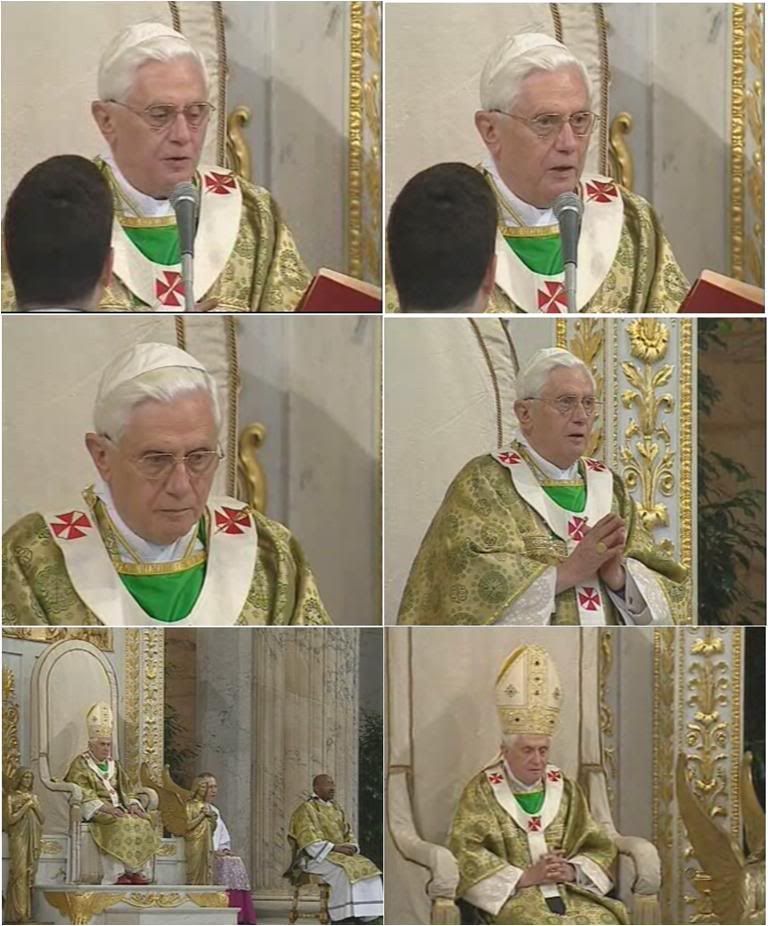
[Modificato da TERESA BENEDETTA 06/10/2008 01:06] |
 05/10/2008 19:16 05/10/2008 19:16 |
|
| | | OFFLINE | | Post: 15.214 | Registrato il: 28/08/2005
| Utente Gold | |
|
At long last, Ecclesia Dei has opened a website dedicated to Summorum Pontificum and its implementation.
www.ecclesiadei-pontcommissio.org/
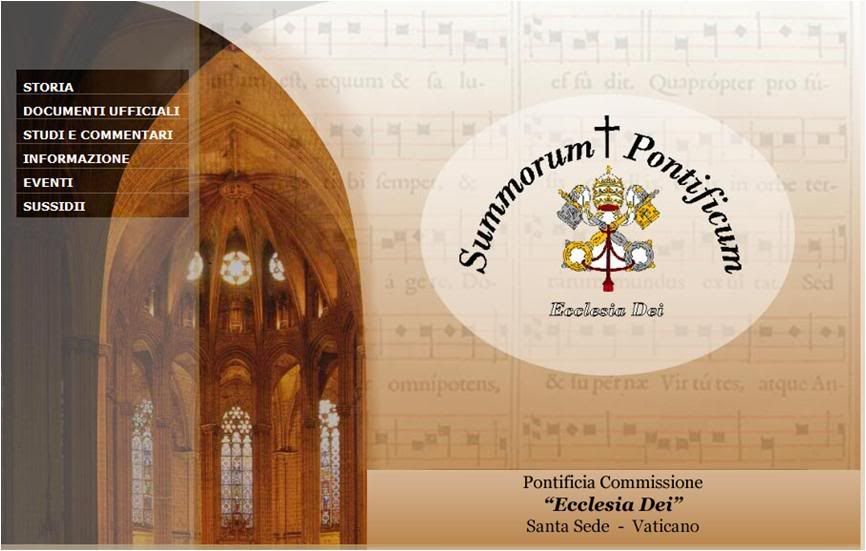
Right now, it is in Italian only, but it will be multilingual.
|
 05/10/2008 21:45 05/10/2008 21:45 |
|
| | | OFFLINE | | Post: 15.215 | Registrato il: 28/08/2005
| Utente Gold | |
|
 ANGELUS TODAY
ANGELUS TODAY
The Holy Father led the noontime Angelus from his window overlooking St. Peter's Square today.
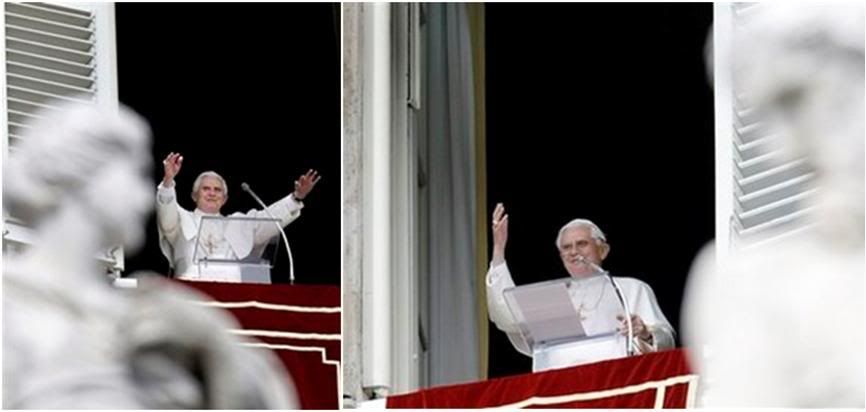
Before the prayer, he spoke about the opening of the Bishop's Assembly today and its significance. After the prayer, he said he would be starting off tonight's Bible-reading marathon on Italian TV at 7 p.m.
Here is the full translation of the Holy Father's words:
ANGELUS OF 10/5/08
Dear brothers and sisters:
This morning, the Holy Mass at the Basilica of St. Paul outside the Walls marked the start of the XII Ordinary General Assembly of the Synod of Bishops, which will be held at the Vatican over the nest three weeks on the theme "The Word of God in the life and mission of the Church".
You know the value and function of this particular assembly of bishops, who were chosen to represent the entire episcopate and have been convoked to bring effective assistance to Peter's Successor, at the same time manifesting and consolidating ecclesial communion.
It is an important organism instituted in September 1965 by my venerated predecessor, the Servant of God Paul VI (cfr Lett. ap. motu proprio data "Apostolica sollicitudo"), during the last phase of the Second Vatican Council, in accordance with a recommendation contained in the Decree on the Ministry of Bishops (cfr Decr. Christus Dominus, 5).
These are the objectives of the Synod of Bishops: to favor close unity and collaboration between the Pope and the Bishops of the whole world; to furnish direct and precise information on the situation and problems of the Church; to facilitate agreement on doctrine and pastoral action; to deal with matters of great importance and relevance.
These diverse tasks are coordinated by a Permanent Secretariat which works directly under the immediate authority of the Bishop of Rome.
The synodal dimension is constitutive of the Church. It consists in coming together from every people and culture to become one in Christ and to walk together after him who said, "I am the way, the truth and the life" (Jn 14,6).
In fact, the Greek word 'synodos'- composed of the preposition 'syn' (with), and 'odos', meaning way or road - suggests the idea of 'walking together', which is the precise experience of the People of God in the history of salvation.
For the Ordinary General Assembly which began today, I chose, after getting authoritative opinions about it, as the theme to be examined in depth the Word of God in the pastoral perspective, in the life and mission of the Church.
The local Churches around the world had ample participation in the preparatory phase, having sent their contributions to the Secretariat of the Synod, which on this basis prepared the Instrumentum laboris, the document which will be discussed by the 253 Synodal fathers: 51 from Africa, 62 from the Americas, 41 from Asia, 90 from Europe, and 9 from Oceania.
In addition, there will be a number of experts and auditors, men and women, as well as fraternal delegates from the other churches and ecclesial communities, and some specially invited persons.
Dear brothers and sisters, I ask you all to support the work of the Synod with your prayers, specially invoking the intercession of the Virgin Mary, who was the perfect Disciple of the Divine Word.
After the Angelus, he said:
Tonight, a singular initiative entitled "The Bible night and day', promoted by RAI (Italian state TV), will be realized.
It involves the continuous reading of the entire Bible for seven days and seven nights, starting today until Saturday, October 11, broadcast live on television.
The broadcasts will originate from the Roman Basilica of Santa Croce in Gerusalemme, with some 1,200 readers from 50 different nations, some chosen according to ecumenical criteria, and many from voluntary applicants.
This event complements the Synod of Bishops on the Word of God, and I myself will start the readings, from the first chapter of the Book of Genesis, which will be broadcast at 7 p.m. tonight on RAI-1.
This way, the Word of God may enter homes to accompany the life of families and individuals - a seed which, if well received, cannot fail to bear abundant fruits.
This was his greeting in English:
I am happy to greet all the English-speaking pilgrims and visitors present for this Sunday Angelus prayer.
In today’s Gospel Jesus speaks of his death at the hands of those who did not heed the voice of God and progressively closed their hearts to truth, justice and love.
Let us pray with confidence that the Lord will guide our steps and grant us patience and constancy in doing God’s holy will!
I wish you all a pleasant stay in Rome, and a blessed Sunday!
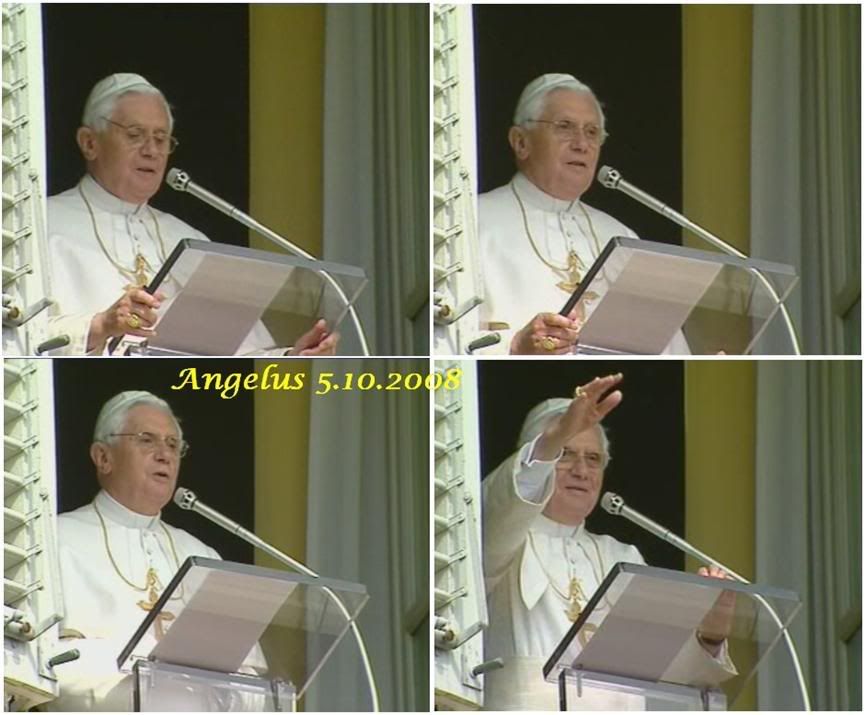 Videocaps courtesy of Caterina in the main forum.
Videocaps courtesy of Caterina in the main forum.
[Modificato da TERESA BENEDETTA 06/10/2008 01:36] |
 05/10/2008 22:59 05/10/2008 22:59 |
|
| | | OFFLINE | | Post: 15.216 | Registrato il: 28/08/2005
| Utente Gold | |
|
 Avvenire
Avvenire, the daily newspaper of the Italian bishops conference, has an advantage over L'Osservatore Romano, the official organ of the Vatican, in that it has at least 3 times as many pages daily - a minimum of 24 to as many as 36 some days (plus a four-page supplement devoted to news about Milan and the Lombardy region), compared to the 8 pages to which OR is limited at present.
It therefore has the look and sense of a 'normal' daily newspaper - in fact, it has a very attractive contemporary graphic look and layout, better than the major Italian MSM papers. But it devotes as much space as necessary to coverage of what is happening in the Catholic Church, and if I lived in Italy, I would not hesitate to make it my primary daily newspaper. It would be great if there were a Catholic general newspaper like this in every country.
Today's issue, for instance, gives equal prominence to the Bishops Synod as to the Pope's visit to the Italian President yesterday:
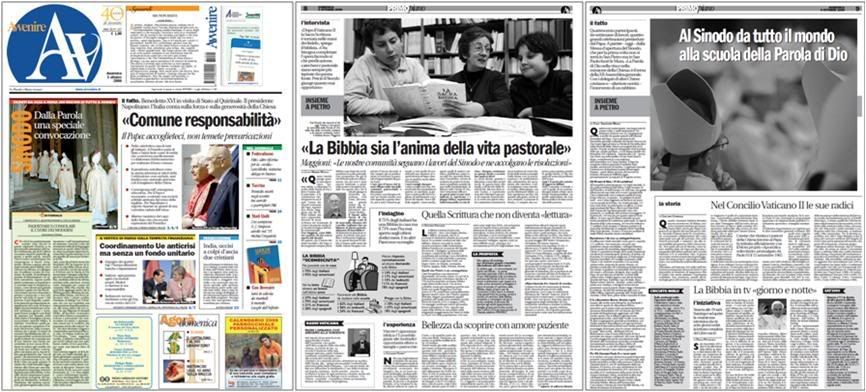
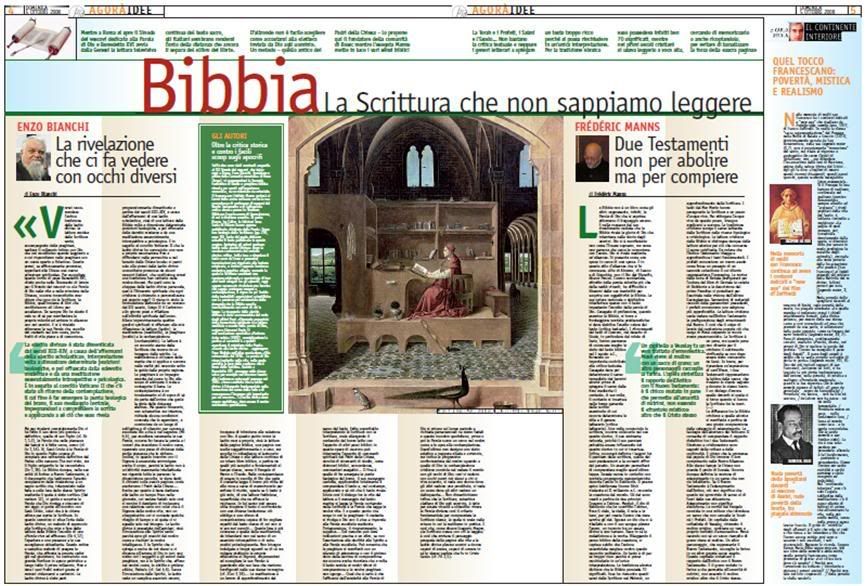
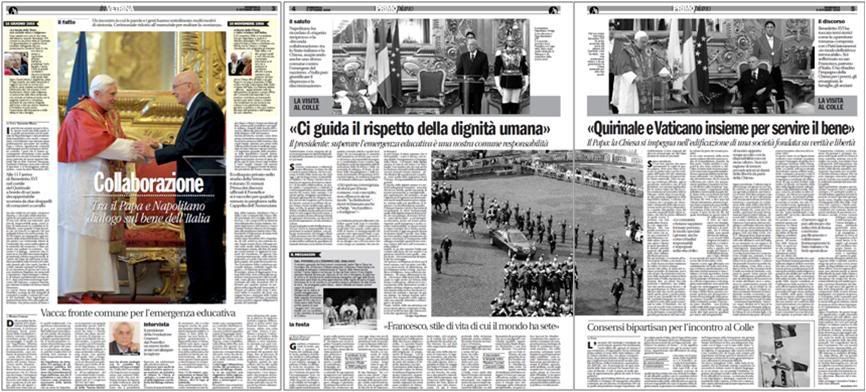 Here is Avvenire's main report on the Pope's visit to the Quirinal:
Between the Pope and the President:
Here is Avvenire's main report on the Pope's visit to the Quirinal:
Between the Pope and the President:
A dialog on what is good for Italy
By SALVATORE MAZZA
Translated from
the 10/05/08 issue of

Gestures always say a lot, Often much more than words do. If those pronounced yesterday at the Quirinale by papa Ratzinger and the President of the Republic said a lot to underscore the almost mirror-like convergence of Church and State in a commitment to the construction of the common good, the gestures that came with the words showed that the harmony was not simply a formality born out of good bilateral relations. It goes beyond that.
In fact, as Pope Benedict XVI said, "the Quirinale and the Vatican are not two hills that ignore each other nor confront each other rancorously" but two entities between which there is 'reciprocal respect; and 'fecund collaboration'.
The gestures included, their smiles, hands that not merely shook each other but held, small almost imperceptible signs that transform courtesy to familial informality, such as when the Pope took the President's wife by the arm to explain to her the gift that he had brought for the President.
Such gestures accompanied every moment of the visit by Benedict XVI, thanks also to ceremonial protocol which was deliberately kept to the minimum, and without taking anything from the importance of the occasion, was reduced in order to exalt the substance - meeting and dialog - over the event in itself.
To the point that the band rendition of the national anthems of the to states, at the Pope's arrival, was kept to one stanza each; and that the President and the Pope were already inside to greet guests invited to the occasion while the Vatican flag was still being run up the flagpole on the flag tower of the presidential palace.
Papa Ratzinger arrived at the Palace at 11 a.m. during an unusual brief period of sunshine and calm on a morning that had seen a succession of thunderstorms, after a brief stop on the way at Piazza Venezia to be greeted by the Mayor of Rome, Gianni Alemanno.
The Pontiff's Lancia convertible, escorted by two platoons of Presidential Guards on horseback, entered the front courtyard of the Quirinale, where President Napolitano awaited the Pope at the doorway to the Terrazza Vetrata.
They stood at attention to listen to their respective anthems played by an Army band flanked by a guard of honor from the Italian Navy and Air Force.
They then took the elevator to the second-floor Hall of tapestries where the Pope was greeted by former Presidents Oscar Scalfaro and Carlo Cuampi (Francesco Cossiga was not present because of health reasons); the president of the Italian Senate Renato Schifani; the president of the House of Deputies, Gianfranco Fini; the president of the Constitutional Court, Franco Bile; the president of the Council of Ministers (Prime Minister) Silvio Berlusconi and his special government delegation .
The Pope and the President then entered the Vetrata study for a private conversation that lasted 35 minutes, at the end of which the President's wife, Clio, joined them.
Simultaneously, the Pope's delegation led by Cardinal Tarcisio Bertone and Cardinal Angelo Bagnasco, as president of the Italian bishops conference, met with Prime Minister Berlusconi and his delegation in the Napoleonic Hall.
Before proceeding to the Hall of Celebrations for the formal speeches, the Pope stopped at the Chapel of the Annunziata to pray before the Blessed Sacrament.
[ The full texts of the speeches are reproduced in the subsequent pages.]
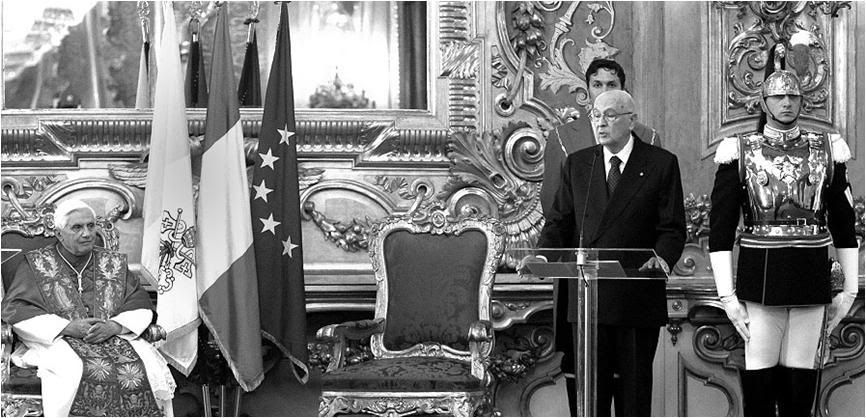
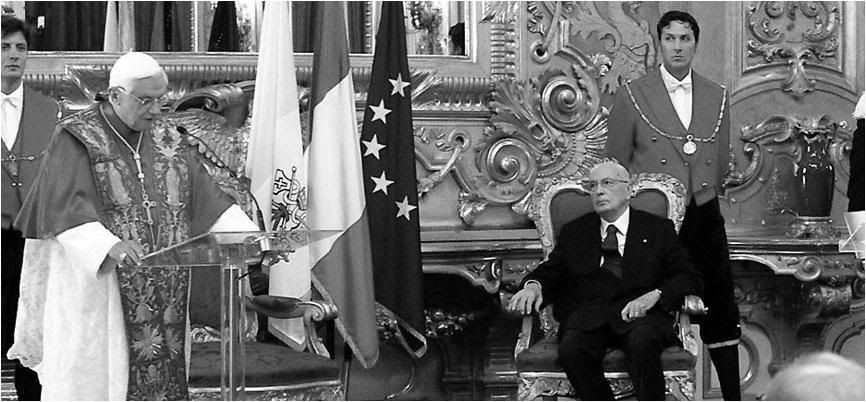 The editorial about the visit:
Church and State have never been
The editorial about the visit:
Church and State have never been
so close together in Italy
by CARLO CARDIA
Translated from
the 10/05/08 issue of

The solemn protocol and the informal welcome together express the significance and the value of the meeting at the Quirinale yesterday between Benedict XVI and Giorgio Napolitano.
The good relations between Italy and the Holy See were evident in a harmony between the Pope and the President of the Republic which was already clear when they first met at the Vatican in November 2006.
There was no reference, in their official speeches yesterday, to bilateral issues, as much as to say there are no contentious items in the institutional relations between Church and State in Italy. [But you would not think that if you only read what secular opinion-makers in the Italian MSM say almost every day about Church 'interference' in the country's public affairs.]
Even the historical evocations - Napolitano refers to the 'the wounds of history', the Pope to the so-called 'Roman question' - were mentioned only to point out that differences between the institutions on opposite banks of the Tiber have been smoothed out for some time, and that history has seen a lasting concord between the Italian nation and Catholicism as two realities which are inseparable because they have been welded together for centuries in a common development, "from the time the boat of Peter came to rest on these shores".
The Pope and the President spoke instead of the role that State and Church, society and religion, can play today for the good of everyone.
Napolitano appeared to take up the thread of the statements he made at the Vatican, acknowledging that Italy is "permeated with the living presence of Christianity", and casts his eye beyond national confines towards the difficult time that now afflicts the global scene.
Italy, the President said, needs the Church, but the world, too, needs the Magisterium of Benedict XVI, especially in its difficult situation today.
He said that the Pope's 'vigilant reminders' about 'the principles of justice in the distribution of resources' is more relevant than ever in the face of social inequality and poverty and the recurrence of conditions that lead to wars and extreme suffering and humiliation of the affected peoples and nations.
He added that the teaching and commitment of the Church in favor of the 'supreme value of human dignity' are indispensable to defeat every form of racial discrimination and contempt; that the values of solidarity and attention to the needs of others are essential even in economics and politics, where events today confirm 'the damages that have resulted from the corrosive collapse of ethics" which is part of the reason for the economic crisis which has now afflicted the richest nations.
All this leads to a sharing the Pope's repeated appeals to face and resolve the 'educative emergency' to restore essential values as the basis for renewed ideal moral aspirations.
Listening to the Italian President brought to mind what French President Nicolas Sarkozy said to the Pope in Paris recently: "Religion gives hope to man, and the Republic needs citizens who are rich in hope".
The words of the Pope were full of acknowledgment and love for Italy and for the bonds that tie it to the Church. In his historical evocation, he paid particular tribute to Saints Francis of Assisi and Catherine of Siena - patron saints of Italy - who expresses best the most precious and intimate core of Italian culture and its spiritual depth.
Responding directly to Napolitano, the Pope acknowledges their mutual concern over the difficulties and fears faced by Italians today and offered the spiritual force of the Church to help resolve together the most difficult problems.
He, too, said that preparing the new generations adequately was the major responsibility for the State and for the Church, that education was the indispensable key to guarantee moral and social development inspired by the values of Christian humanism and to allow the citizens of tomorrow to defeat the temptations of selfishness and the evils of racism and discrimination, in order to achieve 'authentic freedom, the necessary prerequisite for positive service in the common good".
It can be said that if Napolitano widened the agenda to the international horizon, Benedict XVI extended it to the future, underscoring the importance of educating the youth, protecting the family, the concern for free and formative upbringing that every society must have to save itself from decline.
More than on any other occasion, the harmony between Benedict XVI and Giorgio Napolitano, between Italy and the Holy See, appeared strong and resolute, and their common message was a commitment for togetherness, and for the human being and his dignity.
Society and the State, in their autonomy, can avail of Christian experience and tradition as a precious reality that is capable of giving moral and spiritual force to individuals and communities.
I think the editorial egregiously misses pointing out the Pope's statement about the Church not wanting any material or political gains for itself, only a desire to serve man, but that religious freedom includes the assurance that Catholics may be allowed to express their consciences in the light of the Gospel.
He also failed to point out that Napolitano's address was a most unusual and explicit deference to the necessary role of the Church and the teaching the Pope that, coming from an ex-Communist and non-believer, makes one of the best arguments against the paranoid secularists in Italian society who would like nothing better than if the Church and the Pope did not exist at all, oblivious of the fact that the Church and the Papacy have been integral to the development of Italian society, and, as Napolitano said, are realities that are inseparable from the reality of Italy itself..
[Modificato da TERESA BENEDETTA 06/10/2008 02:09] |
 06/10/2008 04:05 06/10/2008 04:05 |
|
| | | OFFLINE | | Post: 15.217 | Registrato il: 28/08/2005
| Utente Gold | |
|
 Pope kicks off 7-day
Pope kicks off 7-day
marathon Bible reading
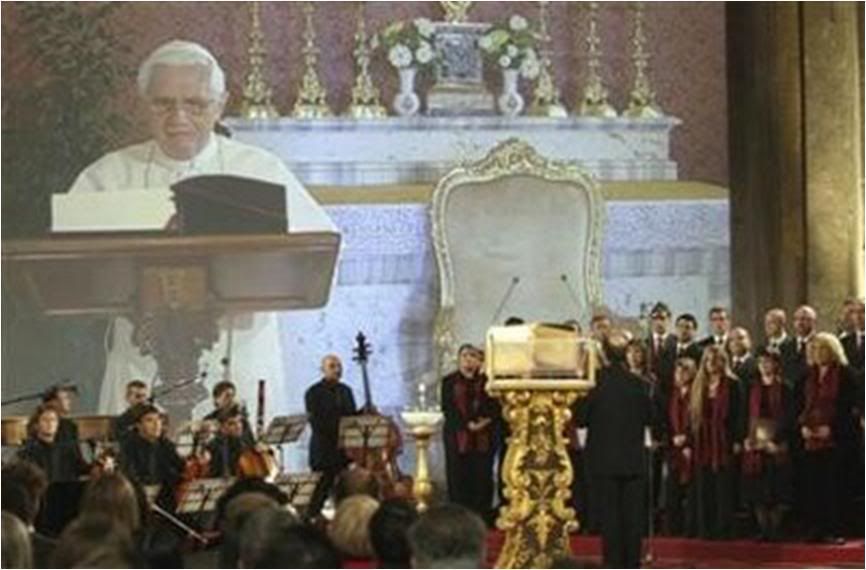
ROME, Oct. 5 (Reuters) - Pope Benedict on Sunday kicked off a seven-day, non-stop Bible reading marathon on Italian television.
The Pope read for several minutes from the start of the Book of Genesis live from his apartments in the Vatican while other speakers read in the Basilica of Holy Cross in Rome.
In the next seven days and six nights, more than 1,200 people will read from the Bible until all 73 books of the Catholic edition is finished.
The second reader was from the Russian Orthodox Church and the third was an Italian protestant leader. Others on the first night included Italian politicians and artists, among them Oscar-winning actor and director Roberto Benigni.
Tenor Andrea Bocelli sang between readings.
Rome's chief rabbi, Riccardo di Segni, had originally agreed to read immediately after the pope but pulled out of the event last month, saying it had become "too Catholic."
The broadcast began live on state broadcaster RAI's first channel and was to continue on one of its satellite channels.
Reflections on Bible reading
Translated from
the Italian service of

Amedeo Lomonaco interviewed Mons. Gianfranco Ravasi, president of the Pontifical Council for Culture, about the Bible-reading marathon on Italian TV which started tonight:
MONS. RAVASI: The Bible presents itself as the Word, and the Word by its nature is proclaimed, said. That's the importance of returning to the Word, and in this case, to make this Word resound, syllable by syllable, entrusted to the voice - I would say to the entire spectrum of possible voices, which are the voices of mankind. This Word that resonates and breaks the silence of nothing, which opens us to being and existence.
We know that a word, once said, is not dead - that is when it starts to live. That is why ideally this reading should be like a point of departure - because the Word has to go through the polluted skies of our cities, it must cross - ideally - all our streets, enter into our homes and return to being what the Bible itself says of itself: a Word that is 'offensive', that causes unease, that undermines even superficiality, banality.
Jeremiah says, "My word is like a hammer that breaks rock" - the rock of incrustations, of banalities we would say today.
And so, here we are to recover this Word which we shall make resound for once in its entirety under the vault of this Roman Basilica, that it may be a lamp beneath our feet in our journey of life.
For the person who has never come near the Bible, the exhortation is to relive the experience of St. Augustine whose conversion came with that 'Tolle lege' - take it and read.
Yes, that's true. We can use it as a motto. But of course, it also means one must start all over with an itinerary to follow. Taking the Bible and opening it at random to any page is not at all the correct thing to do, even though sometimes it can be sort of a stimulus.
What is needed is for this 'take it and read' to have a certain continuity, with some seriousness and faithfulness. The appeal we are launching [with the Bible reading event] is merely that of seeking as much as possible to reach the Word with one's own continuous and constant knowledge, and one's continuous and constant life experience.
In this exploration, to read and scrutinize the Bible is to place oneself before God in an attitude of openness, without judging the Word which is inspired by God,but allowing oneself to be guided by the Word ....
Let us be guided by the Word, but the Word must be understood, it must be penetrated with human ability, with personal freedom.
There is a very beautiful statement in the Apocalypse which can summarize this: "Here I am, knocking at the door. If someone opens it, I will come in, I will dine with him and he will dine with me".
Christ goes through the streets of the world, his Word too, and if it does not, then we will be alone in this world, in our small finite horizon. But what is indispensable is - "If someone opens the door to me': that is where freedom comes into play, freedom to receive the Word.
If one wants it, there is grace which, as Paul says, lights up the heaven in our life and is God's absolute primacy. But there is faith, which Paul says is man's response. In this encounter, this weaving together, is all the mystery of the Bible and of Revelation.
However, also yesterday, Mons. Ravasi, a well-known Biblicist among his many qualifications, wrote an essay for L'Osservatore Romano about the right approach to the Bible. Here is a translation:
The pentagram of Biblical verbs
by Gianfranco Ravasi
President
Pontifical Council for Culture
Translated from
the 10/5/08 issue of

"Is it not extraordinary that the Bible and its language speak to everyone everywhere? Why do these words never become boring? Where can we find a story so old about a small group of people in a foreign country, who only needed to be written about in order to obtain the gift of ubiquity?"
It was not a spiritual author who evoked the unexhausted and inexhaustible message of the Biblical Exodus in such passionate terms, but a Marxist philosopher, Ernst Bloch, in an essay with an evidently provocative title, Atheism in Christianity (1968).
Of course, it is true that he then adds: "Or better yet, these words are boring always and only when they are spoken of to say they have been heard."
Perhaps it is precisely in this 'sentito dire' ('we have heard' or 'it has been said'), that is, a pallid and banal knowledge, though strewn over sacredly with mediocre incense, or secularistically varnished with low-brow sarcasm, which makes the Bible boring, something like a useless old sword.
In fact, to get near it and seize it with the hands, one risks discovering that it is a red-hot iron that burns, as Bernanos warned.
On the eve of this Bishops Synod that is dedicated to the Word of God, we wish to propose a sort of lexicon - very simple and free - of decisive Biblical verbs, but not according to lexicographic criteria of their textual occurrence nor the spectrum of their semantic value.
There emerges a pentagram capable of making us grasp the 'harmonic inspiration', both divine and human, in these pages.
Pages of a book - Biblia, in Greek - which are the 'books' par excellence, are nonetheless the narration of a story which, with the famous essay The great code by Northrop Frye, we can articulate in seven acts: creation (space and the cosmos), exodus (time and history), law (morality and sin), wisdom (existence, love, and evil), prophecy (truth and justice), Gospel (Christ, the Apostles,Church) and Apocalypse (resurrection and eschatology).
Before the Book, however, is the Event, the Word-Deed that tore open the silence of the void.
Our first verb will be the divine 'to say' - amar in the Hebrew Genesis: "God said 'Let there be light, and there was light' (1,3), the Logos of the Johannine prolog: "In the beginning was the Word (1,1). A speaking that is effective, creative and redemptive, such that the God of the prophets sealed his oracles saying dibbartî we 'asîtî, "I have said it and I will do it" (Ezechiel, 37, 14).
Dabar, in Hebrew, is not just 'word' but also 'act, fact, event'. On Sinai, Moses reminds us: "The LORD spoke to you from the midst of the fire. You heard the sound of the words, but saw no form; there was only a voice" (Deut 4,12).
The Lord is par excellence the Voice who speaks even in silence, if its true that on Sinai Elijah would discover the divine presence in a "voice of subtle silence' (1 Kings 19,12).
The Bible, then, before being graphè/graphaì, 'Scripture/Scriptures', is the 'proclamation' of a word, miqra, as Jewish tradition calls it, using the same root that would give its name to the Quran, the 'proclaimed reading' of Islam.
It is the Christian kèrygma, the voice of the evangelical herald who should cry out from the rooftops what it has learned in church (Mt 10,27).
That is why, more than being 'mala dizione' (bad diction), the sloppy and dragged-out liturgical reading that has been done from our pulpits is a malediction, a curse. The Bible is a living word, cutting like a sword and threatening like a hammer, which requires embarking onto new information channels (now about to migrate fully from the printed page to the electronic screens, from the cobblestones of cathedrals to the hairshirt of the new communications).
Its great narrations should resonate, with the sumptuous apparatus of their stories, parables and symbols, in a society without memories, often relying only on empty soundbite messages.
Using a bit freely a Platonic image (the philosopher was partial to the authentic 'to say' of the teacher, the 'to write' of the erudite), we are in a time of 'the shells of Adonis', where seeds are cultivated in scant soil that can only bear thin and frail twigs.
The Biblical Word is, yes, a microscopic seed such as the mustard seed, but aims to grow to a majestic tree in the horizon of history. Not for nothing did this Word, for centuries, nourish Western culture, of which it had become almost the 'code' for artistic and ethical references (think of the 10 films of the Decalog by Kieslowski*) - it is 'the great iconographic atlas', the first symbolic lexicon, "the colorful alphabet into which painters have dipped their brushes" (to use a glorious expression by Chagall), the 'well-tempered' instrument of the most elevated European music.
Shema' Jisra'el, "Listen, Israel!", is the great cry in Deuteronomy (6, 4) which constantly pervades the life of the faithful whose motto is the words themselves of Christ in the Fourth Gospel: "Whoever belongs to God hears the words of God; for this reason you do not listen, because you do not belong to God" (Jn 8,47).
The emblematic figure of the believer is Mary who, as Luke notes (2,19), "kept all these things, meditating in her heart" the word-events that opened up before her, meriting one of her Son's beatitudes, "Blessed are those who hear the Word of God and observe it" (Lk 11,28).
Just as the divine and human 'to say' is effective, in which "a word said is not a dead word but one that is ready to live" - as the American poetess Emily Dickinson put it - so also God's 'to listen', 'lending his ear' to the supplication of his faithful, is active and operative.
That is why in Italian, the 'ab-surdity' of a situation arises from the sordita (deafness) of human intelligence, because listening is decisive in communications.
Because of this, another poetess, the German Nelly Sachs, invited us to 'unclose the ear', liberating it of the obstructions of chatter, to allow the prophetic Word to effectively exercise its own offensive (pro-active) capacity to undermine the terrain of superficiality and habit: "If the prophets burst through the doors by night,/ slashing wounds in the fields of habit,/ if the prophets burst through the doors at night,/ seeking an ear as their homeland,/ the ear of man, obstructed by nettles,/ then you will listen!"
To educate in listening - an intellectual and emotional activity which is anything but simple, above all in a world like ours made up of images, of strong impressions, of distracting noises, and the background buzz of electronic communication - becomes an indispensable exercise.
Only listening can activate the divine dream sketched by the prophet Amos: "Days are coming, says the Lord GOD, when I will send famine upon the land. Not a famine of bread, or thirst for water, but for hearing the word of the LORD" (8,11).
Intimately correlated with 'to listen' is 'to understand' which, it is known, in Biblical language but even in modern 'gnoseology', is not confined to the brain, that is to say, it is not merely intellectual rationality, but also embraces the will, sentiment, passion and even action (it is likewise well-known that the typical Biblical verb 'to know', jada'/ghinòskein, also designates the sexual act between two persons "who know each other' through love).
True knowledge, in fact, is not merely 'informative' but 'performative' - it transforms and transfigures, giving rise to
hokmah/sophìa, 'wisdom', which is much more than mere cultural equipment and erudition, but the Latin sàpere, "to taste', to be endowed with a global and comprehensive symbolicity, a 'flavorful knowledge' to use an expression of the philosopher Jacques Maritain.
It is in this light that one can explain (certainly not according to gnostic indications) the famous statement of Jesus in the Johannine gospel: "Now this is eternal life, that they should know you, the only true God, and the one whom you sent, Jesus Christ" (17, 3).
At this point, we should lay on the table the complex question of Biblical hermeneutics, to which we can only allude briefly. It is significant to note that medieval tradition (of which Dante is an extraordinary witness) tried to dam up the 'overflowing significance' of the sacred Word - to adapt an expression of the critic Carlo Ossola - within the famous four hermeneutic registers called the spiritual 'senses' par excellence - the literal, the allegorical, the tropological, and the anagogical.
This practice already showed then how impoverished was the 'literalist' way which chained the Word to fundamentalism, ignoring the richness of a Logos which is eternal and infinite, even if anchored and intimately woven into the sarx, the 'flesh' of the 'letter', of history.
It is precisely in this perspective that, in the assault on and struggle with the divine Word in order to understand it (the image is from the medieval Rupert of Deutz), Biblical interpretation should go above and beyond the separation - not to mention antithesis - between history and faith, between historico-critical method and theology, between symbol and truth, between philological research and pastoral use, between the academy and the pulpit, between scientific exegesis and spiritual reading.
In an essay entitled Biblical interpretation in conflict, the then-Cardinal Joseph Ratzinger lamented a kind of 'hiatus between exegesis and dogma' which extended to ecclesial life, and which urged a response to the question that John Paul II had proposed to the Church when he wrote in Tertio Millennio adveniente: "To what extent has the word of God become more fully the soul of theology and the inspiration of the whole of Christian living, as Dei Verbum sought?" (No. 36).
Yes, because that Conciliar Constitution showed active interest in the ecclesial, 'apostolic' aspect of the exegetical task, without thereby abdicating the rigor of a critical approach: "Catholic exegetes then and other students of sacred theology, working diligently together and using appropriate means, should devote their energies, under the watchful care of the sacred teaching office of the Church, to an exploration and exposition of the divine writings. This should be so done that as many ministers of the divine word as possible will be able effectively to provide the nourishment of the Scriptures for the people of God, to enlighten their minds, strengthen their wills, and set men's hearts on fire with the love of God" (No. 23).
A great teacher of exegesis like the Jesuit Luis Alonso Schökel was right when he observed that "the study of the Bible runs the risk of becoming a science not of the Bible but of the scholars. But the Bible was not written for scholars. Besides, to know all the data regarding a text is not yet to understand the text".
It is therefore necessary to re-acquire a real hermeneutic equilibrium between indispensable critical analysis and the 'canonical' synthesis of the sacred Book, with the Bible itself as the final inspiration, because for all its real historico-literary multiplicity, it remains a unitary synchrony of the Divine Word.
In this light, the figure of Christ becomes capital as the true and proper guiding thread that runs through the Bible. this is evident, not only through an extrinsic and allegorical listing of the pre-figurative texts present in the old Testament, but rather through the rediscovery of the compactness of the dialog between God and mankind - God who, as the Letter to the Hebrews notes - "In times past, God spoke in partial and various ways to our ancestors through the prophets; in these last days, he spoke to us through a son" (1, 1-2).
Christ seals a discourse that was distributed over time and delineated in the Sacred Scriptures, and it is in the light of this seal that the words of Moses and the prophets retrospectively acquire their 'full sense', as Jesus himself indicated on that spring afternoon as he walked from Jerusalem towards the village of Emmaus in dialog with Cleophas and his friend, explaining to them "everything written about me in the law of Moses and in the prophets and psalms" (Luke 24, 44-49).
In order to hear/understand authentically the proclaimed Word, it is therefore necessary to unite the Letter and the Spirit, the memory of events and their salvific attestation, historico-critical analysis and revelation, in the full sense that can be achieved by the 'Spirit of truth' which "leads to truth in its entirety".
It is necessary to intersect the 'genetic' (from Genesis) movement which brings us to the original substance of events and Biblical texts, and the 'destinational' movement, to use the technical term, that is, the capacity of these texts to apply to the present.
Yes, because every genuine interpretation cannot be content with an 'centripetal' itinerary which goes back to the origin of facts and acts and generative recounting of sacred history to isolate, identify and weigh them, but it requires a 'centrifugal' direction as well ,which leads from the core to the periphery, that is, to us today, to the actual existence of the person who listens to and reads those memories.
So too, it is through this double process that inculturation of the Biblical Word must develop in different cultures. It is at this poibt that the third verb in our pentagram takes shape.
TO BE CONTINUED
BIBLE-READING MARATHON
IS OFF AND RUNNING
Following pictures taken at the Basilica of Santa Croce in Gerusalemme, Rome:
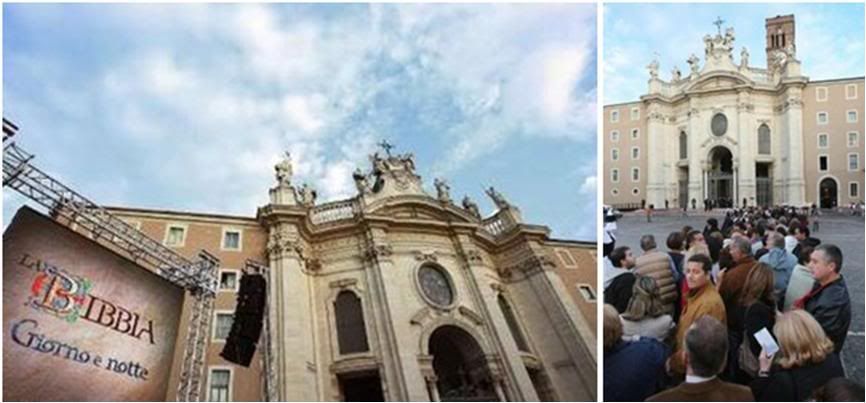
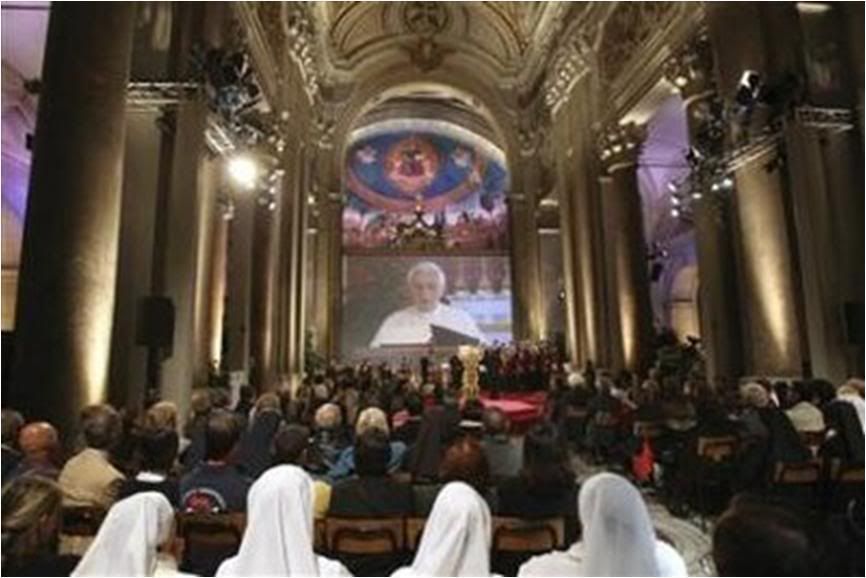
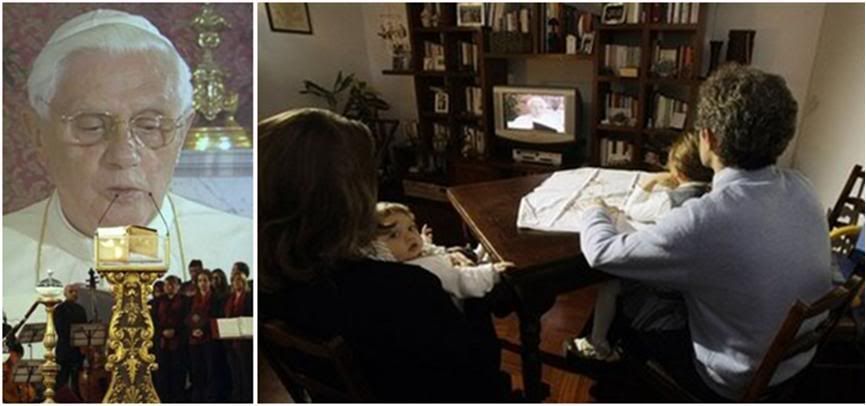
 Among those who read last night: Cardinal Dsiwisz, Giulio Andreotti (6-time Italian Prime Minister, senator for life and publisher of 30GIORNI), Jewish-Italian journalist Gad Lerner, and actor Roberto Benigni.
Among those who read last night: Cardinal Dsiwisz, Giulio Andreotti (6-time Italian Prime Minister, senator for life and publisher of 30GIORNI), Jewish-Italian journalist Gad Lerner, and actor Roberto Benigni.
[Modificato da TERESA BENEDETTA 06/10/2008 16:22] |
 06/10/2008 05:45 06/10/2008 05:45 |
|
| | | OFFLINE | Post: 3.343 | Registrato il: 23/11/2005
| Utente Master | |
|
Pope Benedict XVI starts off Bible marathon reading
For seven days and six nights, more than 1,000 people will read from Genesis to Apocalypse live on state television. The first segment ends with a spirited Roberto Benigni.
By Maria de Cristofaro and Sebastian Rotella
Los Angeles Times Staff Writers
6:22 PM PDT, October 5, 2008
ROME — In the beginning Pope Benedict XVI read these words: "In the beginning God created the heavens and the Earth."
And the pope and millions of viewers watching him on Italian television Sunday night saw that it was good.
The pontiff launched a marathon reading of the Bible, from Genesis to Apocalypse, broadcast live on state television. It will last seven days and six nights. The roster of about 1,300 readers features former Italian presidents, current Cabinet ministers, soccer stars, foreign diplomats, cardinals, intellectuals, actors and opera singers as well as ordinary citizens.
The Vatican invited a multi-faith, multiethnic cross section of participants to the event in the Holy Cross in Jerusalem Basilica here. They include Orthodox clergymen; an Algerian female writer and five other Muslims; and the Israeli ambassador to the Vatican, along with a survivor of the Auschwitz concentration camp and 14 other Jewish readers.
Organizers wanted to make it clear, the Vatican said in a statement, that "the Bible belongs to everyone without any discrimination or cultural or ideological barrier." The message was underscored by the pope's decision to take part, as the pontiff explained in comments to the faithful after Sunday Mass at St. Peter's Basilica in Rome.
"In this way the word of God can enter homes to accompany lives of families and individuals," Benedict said. "A seed that if well received will not fail to bring abundant fruits."
Although the pope tends to have a quiet, reserved style, he liked the idea of making the Bible accessible, Vatican officials said. Moreover, the timing was good because Sunday marked the start of the bishops synod, an assembly of bishops from around the world.
"The reason the pope has agreed is to give his support to a program intended to bring the listening and reading of the Bible to a wider public of every age and condition," said Father Federico Lombardi, director of the Vatican press office, in an interview. "The church encourages the faithful to read and understand the Holy Scriptures. . . . The pope, therefore, intends to give a personal example . . . at a moment when the entire Catholic Church is reflecting and praying on the centrality of the Holy Scriptures in its life."
The pope chose not to attend in person for security reasons and to avoid being a distraction, organizers said. Dressed in white vestments, Benedict opened the 139 nonstop hours of the "Bible Day and Night" program in a live video link broadcast to the audience in the basilica from his apartments in the Apostolic Palace.
The 81-year-old pontiff seemed a bit subdued, looking at the camera only briefly toward the end of his reading. He was followed by Russian Orthodox Bishop Hilarion Alfeyev, representative of the Moscow Patriarchate to the European Union in Brussels, and Domenico Maselli, an Italian Protestant leader.
The first segment ended with Roberto Benigni, the manic, frizzy-haired actor-director who won two Oscars for " Life is Beautiful" and is Italy's most beloved comic. Departing from the previously solemn tone of the evening, Benigni gave a cheerful, spirited performance that drew the first applause of the night. Andrea Bocelli, a noted tenor, sang between readings.
Despite the inclusive rhetoric of the organizers, not everyone they invited took part. Riccardo Di Segni, the chief rabbi of Rome, told the Italian media that he had declined because he felt the event was "too Catholic," although he respected the initiative.
Nonetheless, Di Segni will be the first rabbi to take part in the synod that began Sunday.
The first five books of the Old Testament are the Torah, the Jewish holy book. Muslims regard the Bible as a precursor to the Koran, their holy book.
The marathon will end Saturday with Cardinal Tarcisio Bertone, the secretary of state of the Vatican, reading the 22nd chapter of the Book of Revelation.
|
 06/10/2008 05:52 06/10/2008 05:52 |
|
| | | OFFLINE | Post: 3.344 | Registrato il: 23/11/2005
| Utente Master | |
|
Synod: A Rabbi, a Jesuit and the Pope walk into a bar …
By JOHN L. ALLEN JR.
National Catholic Reporter
Created Oct 5 2008 - 15:59
Rome
It sounds suspiciously like a joke in search of a punch-line: “The pope, a rabbi and a Jesuit walk into a bar.” Change the word “bar” to “synod hall,” however, and it's no joke, but rather the agenda for Monday afternoon’s session of the Synod of Bishops on the Bible, in what promises to be among the early highlights of the three-week event.
The rabbi in question is Shear Yashuv Cohen, the chief Ashkenazi rabbi of Haifa, Israel, and a figure whose remarkable life story reflects the vicissitudes of modern Israel. The Jesuit is French Cardinal Albert Vanhoye, a Biblical scholar renowned for his work on the Letter to the Hebrews, and a former secretary of the Pontifical Biblical Commission.
The pope, obviously, is Benedict XVI.
On Monday afternoon, Cohen will make a presentation to the synod on the Jewish approach to the Bible, followed by remarks from Vanhoye on how Christians understand the Jewish scriptures. Among other things, Vanhoye is expected to draw upon a 2001 document from the Pontifical Biblical Commission titled “The Jewish People and their Sacred Scriptures in the Christian Bible.”
Cohen will become the first non-Christian to address a synod of bishops, marking merely the latest chapter of what has already been a ground-breaking career.
Born in Jerusalem in 1927 as the son of a famed rabbi, the young Cohen grew up in an intensely religious milieu. As a child he was a “nazirite,” meaning that he took vows never to cut his hair or beard, not to drink wine or eat grapes, and not to attend funerals. At age 16 he was released from those promises, but he remains a strict vegetarian.
The young Cohen also became active in the push for Israeli statehood. He joined a group linked to the Irgun, an armed group demanding a Jewish state. During the fighting that surrounded recognition of the nation of Israel in 1948, in which Jewish forces lost control of the Old City in Jerusalem, Cohen was wounded in the leg and spent time in a prisoner of war camp in Jordan.
“I still remember the day the British left the Old City,” Cohen recalled in a 2007 interview with the Jerusalem Post. “From our outposts, we heard Scottish bagpipes playing and the marching of many soldiers on the cobblestones gradually fading away. We realized we were on our own.”
Cohen has a high profile in Israel, having served both as the country’s Chief Rabbi and as Deputy Mayor of Jerusalem. He was serving in the latter capacity in 1967, when the Six-Day War broke out and Israeli troops recaptured the Old City.
“I had come full circle,” Cohen recalled. “I was the last Jew to leave the Old City of Jerusalem after it fell, and the first to return.”
Cohen heads the Ariel Institute, which trains local rabbis to act as communal leaders and also prepares rabbis to serve in Jewish communities abroad. He has served as Chief Rabbi of Haifa since 1975.
Cohen is also a veteran of Jewish-Catholic relations. Since 2002, the Vatican’s Commission for Religious Relations with Jews, led by Cardinal Walter Kasper, has organized a formal dialogue with the Chief Rabbinate of Israel. Cohen has led the Jewish delegation in those sessions.
Some Jewish analysts say the experience of being chief rabbi in Haifa gave Cohen a jump-start on the art of dialogue, since the city is often sharply divided between secular and religious Jews.
“I don't divide Jews into religious and secular,” Cohen said in 2007 of his own philosophy. “To me, they are all Jews.”
“I don’t believe in coercive religion,” Cohen said, “only in open communications.”
Cohen’s conversation partner tomorrow afternoon, Vanhoye, is arguably more qualified for the role than virtually anyone else among the 400 people who in some way are participating in this Synod of Bishops.
Born in Hazebrouck, France, the young Vanhoye entered the Society of Jesus in 1941. He earned a doctorate in scripture, focusing on the Letter to the Hebrews, from the Pontifical Biblical Institute in Rome, which is linked to the Jesuit-run Gregorian University. From 1963 to 1988 he served as a professor at the institute, and from 1984 to 1990 was its rector.
Vanhoye also served for a stretch as the secretary of the Pontifical Biblical Commission, an advisory body to the Congregation for the Doctrine of the Faith, where he came to know then-Cardinal Joseph Ratzinger.
In 2006, Ratzinger, by then Pope Benedict XVI, elevated Vanhoye to the College of Cardinals, even though the Jesuit was already over 80 and therefore ineligible to vote for the next pope.
Vanhoye requested, and Benedict granted, a waiver from the normal requirement to be ordained a bishop before becoming a cardinal.
Among Vanhoye’s books are three volumes on the Letter to the Hebrews, and one on priesthood in the New Testament.
One striking fact about tomorrow’s three-way encounter linking Benedict XVI, Cohen and Vanhoye is that each is more than 80 years old; Benedict and Cohen were both born in 1927, Vanhoye in 1923.
If age typically brings wisdom, in other words, tomorrow should be a wise day indeed.
|
 06/10/2008 14:16 06/10/2008 14:16 |
|
| | | OFFLINE | | Post: 15.219 | Registrato il: 28/08/2005
| Utente Gold | |
|

No OR today.
THE POPE'S DAY
The Holy Father opened the First General Congregation of the XII Ordinary General Assembly of the Bishops' Synod
1t 9 a.m. today, after the breviary reading for the Third Hour.
Meditation in Italian.
[Modificato da TERESA BENEDETTA 12/10/2008 03:00] |
 06/10/2008 14:38 06/10/2008 14:38 |
|
| | | OFFLINE | | Post: 15.220 | Registrato il: 28/08/2005
| Utente Gold | |
|
 SYNOD WORKING SESSIONS BEGIN
SYNOD WORKING SESSIONS BEGIN
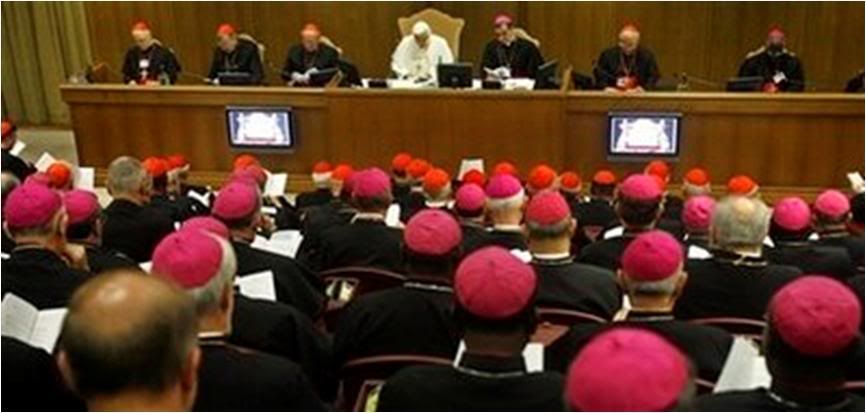 The Pope says the Word of God
The Pope says the Word of God
is the rock on which
to build our life
Translated from
the Italian service of

At the opening of the Synodal sessions today, Pope Benedict XVI said the Word of God is the 'rock' on which to build our life. He said the recent collapse of huge financial banks showed the precariousness of money and of human certainties.
Only the Word of God, he said, can give human life that 'solidity' which cannot be guaranteed in any other sphere, certainly not from the pursuit of money as the current global financial crisis shows too well.
This was one of the thoughts expressed in the Pope's opening meditation from Psalm 118, to open the working sessions of the XII Ordinary General Assembly of the Bishops Synod.
Alessandro de Carolis reports:
To be a 'realist' for a believer, means to turn around the normal meaning given to this word. It means choosing to rest one's own existence on the Word of God, firm in the certainty that comes from the Holy Spirit and through God, 'something as stable as and more than heaven' - or to opt for temporal 'certainties', which are destined sooner or later to slip like the house built on sand evoked by Jesus in the Sermon on the Mount.
Psalm 118 offered Benedict XVI this point of reflection to open the Synodal undertaking. Speaking of the 'rock' in Biblical teaching, and its ephemeral opposite, the Pope explained its meaning by using the most obvious example on the international scene today:
It is on sand that he builds who only builds on visible and tangible things, on success, on career, on money. These appear to him as the true realities, but we now see, in the collapse of the great banks, that money disappears, it is nothing, just as all that seem to be 'true reality' on which we rely are only realities of the second order.
He who builds his life on such realities - on material things, on success and all that simply 'appear to be' - builds on sand.
On the other hand,
[The Word of God] is the true reality on which to base our life. Let us recall the words of Jesus who extended the words of the Psalm: "Heaven and earth will pass away, but my Word will not".
Humanly speaking, the word, our human word, is almost nothing, a whiff of breath which disappears as soon as we say it, which will seem like nothing. But the human word does have an incredible power - they are the words that make history. Even much more, therefore, the Word of God is the foundation of everything. It is the true reality....
We should change our concept of realism. To be realistic, we must count on this reality, change our idea that only material things, solid things that can be touched, represent the most solid and most secure realities.
The realist is he who acknowledges in the Word of God the foundation of everything. The realist is he who builds his life on this foundation which will be there in permanence.
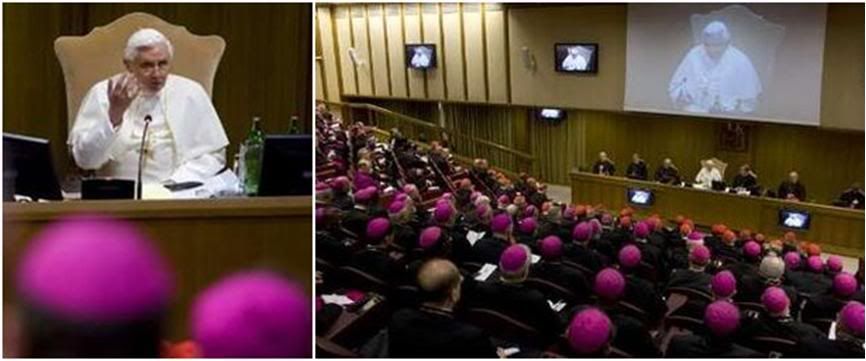 Pope says financial crisis
Pope says financial crisis
shows money is an illusion

VATICAN CITY, Oct. 6 (Reuters) - Pope Benedict said on Monday that the global financial crisis showed that faith in God trumped a lifetime spent pursuing material wealth.
"We see it now in the collapse of the great banks that money disappears, it's nothing," the Pontiff said.
The global financial turmoil, the worst since the Great Depression, has wiped away hundreds of billions of euros (dollars) in shareholder wealth and felled banking institutions that just months ago seemed untouchable.
The Pontiff, using a biblical metaphor, said people who ignored the word of God to pursue wealth had effectively built their homes on sand instead of on a solid foundation of faith.
It was a possible reference to the collapse of the U.S. housing market, which triggered the financial crisis.
"Whoever builds his life on this reality, on material things, on success ... builds (his house) on sand. Only the word of God is the foundation of all reality," he said.
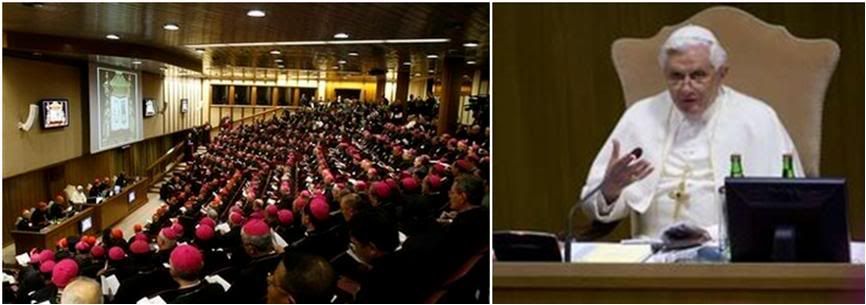 Pope says financial crisis
Pope says financial crisis
shows the futility of money

VATICAN CITY, Oct. 6 (AP) - Pope Benedict XVI says the global financial crisis show the futility of money and ambition.
Benedict says that "now with the collapse of big banks we see that money disappears, is nothing and all these things that appear real are in fact of secondary importance."
He urges those who build their lives "only on things that are visible, such as success, career, money" to keep that in mind.
The Pontiff was speaking Monday as he opened a meeting of 253 bishops at the Vatican.
Benedict says "the only solid reality is the word of God."
Cardinal Ouellet's opening remarks:
How to help the homilist

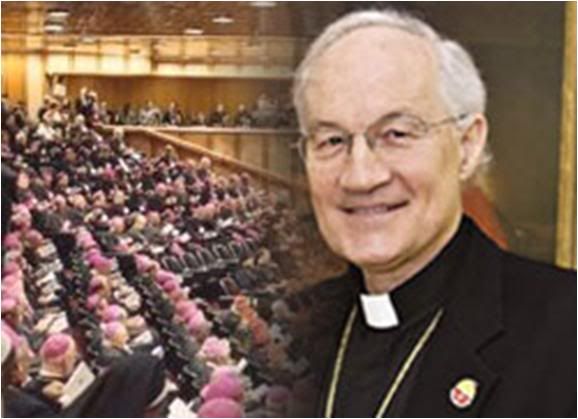
VATICAN CITY, October 6 (Translated from SIR) - "The purpose of this Synod is predominantly pastoral and missionary. It consists in listening together to the Word of God to discern how the Holy Spirit and the Church aspire to respond to the gift of the Word Incarnate through love for the Sacred Scriptures and announcing the Kingdom of God through all mankind."
These were the words of Cardinal Marc Ouellet, Archbishop of Quebec and general moderator of the current Synodal assembly in his opening address today (« Relatio ante disceptationem »).
"The Synod," he said, "will propose pastoral guidelines 'to reinforce the practice of encounter with the Word of God as the source of life', in accordance with the thinking of Vatican-II about the Word of God and its link to ecclesiastical renewal, ecumenism and the dialog with nations and religions."
"Thanks to the trinitarian and Christocentric vision of Vatican-II," he said, "the Church has renewed its own awareness of its mystery and mission. The Dogmatic Constitution Lumen Gentium and the Pastoral Constitution Gaudium et Spes develop an ecclesiology of communion which is based on a renewed concept of Revelation... thus laying the bases for a more lively encounter and dialog between God who calls and his people who respond."
"Effectively, the experience of the faith and the missionary impulse of Christians are profoundly affected by different socio-cultural phenomena such as secularization, religious pluralism, globalization and the explosion of communications media, with their multiple consequences, such as the growing gap between rich and poor, the proliferation of esoteric sects, the threats to peace, without forgetting the current assault against human life and the family."
"To these socio-cultural phenomena, we must add the internal difficulties of the Church regarding the transmission of faith in the family, the deficiency of catechetical formation, the tensions between the Magisterium of the Church and academic theology, the internal crisis within exegesis and its link to theology, and more generally, a certain separation between scholars and pastors, and between the simple folk and the Christian communities."
These situations, Ouellet noted, show "the great challenge in transmitting faith in the Word of God today. In a pluralistic world, characterized by relativism and esotericism, the idea of Revelation itself requires clarifications".
"Notwithstanding the re-ordering of the homily by the Council, we still experience the dissatisfaction of many faithful regarding the ministry of preaching(which explains in part why many Catholics have gone over to other religious groups."
In order to fill up the deficiencies of preaching, he said, "we know it is not enough to give priority to the Word of God, since its should also be interpreted correctly in the mystagogic context of liturgy."
Nor does it suffice to resort to exegesis and the use of new pedagogical or technological methods. And not even that the personal life of the minister is in profound harmony with what he preaches.
"All of that is very important, but they can remain extrinsic to the
fulfillment of Christ's Paschal mystery," Ouellet said.
"How can we help the homilist to relate the Word and life to this eschatological event so that it can make an irruption in a gathering of the faithful? The homily should arrive at the profound spirituality - namely, Christological - of Sacred Scriptures."
The cardinal proposes that the Pope
write an encyclical on Scriptures
VATICAN CITY, OCT. 6, 2008 (Zenit.org).- Just a few minutes after the Synod on the Word of God got underway today, a proposal surfaced: that Benedict XVI write an encyclical on the interpretation of Scripture.
The request was presented by Cardinal Marc Ouellet, archbishop of Quebec, in the first general comgregation of the assembly. The Pope presided over the conference, which was attended by 244 synod fathers.
After some brief remarks from the Pontiff and then from Cardinal William Levada, prefect of the Congregation for the Doctrine of the Faith, Cardinal Ouellet, general moderator of the Synod, read out the "relatio ante disceptationem" (report before the discussion).
The cardinal noted that theology faculties and exegetes sometimes do not coincide with the Magisterium's vision of the Bible.
In this scenario, he said, there is "an excessive variance of interpretations. […] The internal connection of exegesis with the faith is no longer unanimous and the tensions increase among exegetes, pastors and theologians."
"Certainly historical-critical exegesis is considered more and more with other methods, some of which are in accord with tradition and the history of exegesis," Cardinal Ouellet added. "But in general, after many decades of concentration on the human mediation in Scripture, shouldn't we rediscover the divine depth of the inspired text without losing sight of the valuable acquisitions of the new methodologies?"
The cardinal's proposal focused on interpreting Scripture not as something merely academic, since the Word of God penetrates every dimension of the person.
At the same time, as the Quebec archbishop himself explained to the press afterward, a relationship between exegetes and theologians with bishops needs to be created -- a relationship that rises above tensions to get to communion, clearly respecting the contributions proper to each party.
An example of such a communion, he said, which respects separate roles but without losing sight of Love as the foundation of the word, is the effort being made by the lay Focolare movement.
"It would be opportune for the Synod to question itself on the appropriateness of a possible encyclical on the interpretation of Scripture in the Church," he affirmed.
The cardinal noted to the journalists that there is already a document from the Pontifical Biblical Commission, but said something from the Pope would carry more weight.
[Modificato da TERESA BENEDETTA 07/10/2008 19:05] |
 06/10/2008 17:03 06/10/2008 17:03 |
|
| | | OFFLINE | | Post: 15.221 | Registrato il: 28/08/2005
| Utente Gold | |
|
 Here are John Allen's reports today on Working Day-1 of the current Synod gathering:
The Bible beyond empty piety
Here are John Allen's reports today on Working Day-1 of the current Synod gathering:
The Bible beyond empty piety
and parsing to death
By JOHN L. ALLEN JR.
Rome

Oct. 6, 2008
Already, one clear theme seems to be emerging at the Synod of Bishops on the Bible: the desire for a deeply spiritual way of reading Scripture, one that lies beyond both empty piety and parsing the text to death through historical and literary study.
Cardinal Marc Ouellet of Quebec City, the relator of the synod, issued a strong call this morning for what he called “spiritual exegesis” of the Bible, premised not just on cognitive understanding but, above all, on personal faith and commitment.
Prominent in Ouellet’s audience this morning in the Vatican’s Synod Hall was Pope Benedict XVI, who plans to be present for most of the discussions over the next three weeks.
Ouellet proposed a new “Marian paradigm” for Scripture study – using the Virgin Mary as a model of a response to God’s Word that, in his words, is “dynamic,” “dialogical,” and “contemplative.”
Among other things, Ouellet argued that the Bible has to be seen as part of a broader relationship with Jesus Christ, the “living Word of God,” that’s both personal and also rooted in the community of the church.
Christianity is not really a “religion of the Book,” Ouellet said, but rather a “religion of the Word – not solely or mainly of the Word in its written form.”
The Synod of Bishops on the Bible meets Oct. 5-26 in Rome. This morning, the 253 bishops and other participants heard Ouellet’s relatio ante disputationem, an opening speech intended to set the tone.
Scientific study of the Bible arose in the 19th century, partly as a protest against what was then seen as an overly pietistic approach – one which failed to do justice to the complexities of Scripture, including the human limits and biases of its authors and the clear evidence of historical development within the Bible itself.
Especially since the Second Vatican Council (1962-65), Catholic Bible scholarship made great strides towards a more rigorous form of study, drawing on archeology, linguistics, and the social sciences, but some charge that in the process the spiritual dimension of the Bible was either forgotten or deliberately suppressed.
In effect, Ouellet’s argument amounted to a plea to bring science and spirituality together in order to rediscover the “divine depth” of Scripture.
“Either the exegetes and theologians rigorously interpret the Bible in faith and listening to the Spirit,” Ouellet said, “or they hold to the superficial characteristics of the text, limiting the considerations to historical, linguistic or literary ones.”
Ouellet argued that the Bible must be read within the “living tradition” of the church, especially its official teaching authority, in order to avoid what he termed “subjectivist” readings.
He was also critical of what he called “a questioning of the unity of the scriptures and excessive fragmentation of interpretations” among some Biblical scholars, as well as a “climate of often unhealthy tension between university theology and the ecclesiastical magisterium.”
To improve that climate, Ouellet suggested that the Vatican’s Congregation for the Doctrine of the Faith promote dialogue among pastors, theologians and Biblical experts.
Ouellet, a Sulpician priest, wrote his doctoral dissertation on the famed Swiss theologian Hans Urs von Balthasar, and his speech today was in many ways a classic von Balthasarian analysis, insisting that theological reflection must be rooted in the faith and tradition of the church – what von Balthasar described as a “kneeling theology.”
Thus Ouellet placed great stress on reading the Bible within the context of the liturgy, especially the Eucharist, as well as the fathers of the church and the great saints. He called the liturgy the “crib” of God’s word, its “Sitz im Leben” – a technical term from Bible studies that means its social context.
Among other things, Ouellet said, situating the Bible in the context of the liturgy underscores its “performative virtue,” meaning that it’s intended to “make things happen” in the lives of those who hear it.
Ouellet also called for improved homilies.
“We still feel a great lack of satisfaction on the part of many faithful with regards to the ministry of preaching,” Ouellet said. “In part, this explains why many Catholics turned towards other groups and religions.”
Ouellet recommended a style of preaching that resists “the tendency towards moralism,” but which focuses on the “today” of the community.
Ouellet also suggested greater use of Lectio Divina, a form of prayerful meditation on the Bible, as well as the Divine Office, the daily prayer of the Catholic church, which draws above all on the Psalms.
Ouellet pointed to the Bible as a resource for dialogue with other Christian churches and other religions, especially Judaism and Islam.
With regard to Muslims, Ouellet argued that Christians should see them as natural allies: “Faced with secularization and liberalism, they are allies in the defense of human life and in the assertion of the social importance of religion,” he said.
Earlier in the morning, Cardinal William Levada, an American who serves as Prefect of the Congregation for the Doctrine of the Faith and is one of three co-presidents of the Synod, delivered a welcome to Benedict XVI.
Levada stressed the “indissoluble unity” between the Bible and the “living ecclesial tradition,” adding that “it is not from Scripture alone that the church draws her certainty about everything that has been revealed.”
“This involves the rejection of any interpretation that is subjective or purely experiential or the fruit of a unilateral analysis,” Levada said.
Earlier, he offered this primer on the Synod:
Ten 'firsts' at the Synod of Bishops
By JOHN L. ALLEN JR.
Rome

Oct. 6, 2008
By the standards of a church with over 2,000 years of history, the Synod of Bishops was essentially born yesterday. It was founded in 1965 by Pope Paul VI at the close of the Second Vatican Council (1962-65), as a means of giving bishops around the world a voice in the governance of the Universal Church.
Since the synod is a relatively recent arrival, it’s probably not surprising that it continues to break new ground. Even so, the edition which meets Oct. 5-26 in Rome, with the theme of “The Word of God in the Life and Mission of the Church,” is distinctive for at least ten “firsts” it will occasion:
1. Rabbi Shear Yashuv Cohen, the chief rabbi of Haifa in Israel, will address the synod Monday afternoon, Oct. 6, on Jewish interpretation of the Scriptures. This marks the first time a non-Christian has been given the floor. (Cohen’s remarks will be followed by a reflection from French Cardinal Albert Vanhoye, a Jesuit and former secretary of the Pontifical Biblical Commission.)
2. Patriarch Bartholomew of Constantinople, recognized as “first among equals” in the Orthodox world, will lead a celebration of vespers along with Pope Benedict XVI on Saturday, Oct. 18, and then both men will speak to the synod. This marks the first time a non-Catholic figure has will lead a liturgical service for members of a synod, and the first time an Orthodox patriarch will speak during a synod alongside the Pope.
3. Benedict XVI celebrated the opening Mass of the synod this morning at the Basilica of St. Paul’s Outside the Walls, the first time the opening liturgy has been held anywhere other than St. Peter’s Basilica in the Vatican. Benedict has designated 2008 as a “Pauline Year.”
4. Cardinal Marc Ouellet of Quebec City will serve as the synod’s relator [= "moderator" in English], making him the official responsible for introducing the discussion, keeping it on course, and for synthesizing the results at the end. Ouellet is the first Canadian to hold the post.
5. Archbishop Laurent Monsengwo Pasinya of Kinshasa, of the Democratic Republic of the Congo, will be the special secretary, another key coordinating role. He is not only the first prelate from Congo, but the first African to hold that post during a general synod.
6. On Friday, Oct. 10, there will be a report on the reception of Sacramentum caritatis , the Pope’s document concluding the last synod in 2005 on the Eucharist. That discussion will be guided by Cardinal Angelo Scola of Venice, who served as moderator in 2005. This is the first time one synod has formally reviewed the results of the one that preceded it.
7. On the first day of the synod, there will be five reports from bishops representing the different continents, speaking on how the Word of God is perceived in their part of the world.
In the past bishops have often used their allotted speaking time to comment on their local situations, but this is the first time a panoramic look around the world has been formally built into the schedule.
8. Among the 37 “auditors” [listeners but not participants] or invited guests, at this synod are 19 women – one more than the men, marking the first time women are in the majority.
9. Each afternoon will include not only prepared speeches by bishops and other participants in the synod, but also an hour of “free discussion” time, intended to allow people to respond to things said during the day or to introduce other matters they want the synod to consider.
Benedict XVI instituted this “free discussion” during the Synod on the Eucharist in 2005, but this is the first meeting in which free discussion each day is actually part of the formal rules.
10. Finally, this will be the first time that bishops from around the world gather to discuss a topic after the Pope himself has published a best-selling book on the same subject.
The theme this time around is the Bible, which was also the subject of Benedict XVI’s 2007 title Jesus of Nazareth.
(It should be noted, however, that Benedict XVI has something of a history of shaping the discussion at a synod with a high-profile book released before the fact.
In 1985, the Synod of Bishops met to take stock of the 20 years that had passed since the close of the Second Vatican Council. Press interest, especially in the early days of the synod, focused on how bishops were reacting to a controversial book-length interview with then-Cardinal Joseph Ratzinger, titled The Ratzinger Report, in which the future pope offered his thoughts on the council’s legacy. At one stage, an exasperated bishop snapped during a press conference, “This is a synod about a council, not a book!”)
Thanks for bringing up this last point up, Mr. Allen. As Forum readers know, I have been harping on it every chance I get, citing George Weigel's account of it in WITNESS TO HOPE!
[Modificato da TERESA BENEDETTA 06/10/2008 17:12] |
 06/10/2008 18:40 06/10/2008 18:40 |
|
| | | OFFLINE | | Post: 15.222 | Registrato il: 28/08/2005
| Utente Gold | |
|
 Speaking of JESUS OF NAZARETH, Rizzoli of Italy has come out opportunely with its illustrated edition of the book.
Speaking of JESUS OF NAZARETH, Rizzoli of Italy has come out opportunely with its illustrated edition of the book.
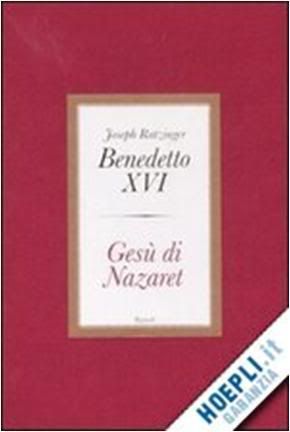
Number of pages: 446
Price: € 38,00
ISBN-13: 9788817019781
ISBN: 881701978X
Here is an excerpt from Mons. Ravasi's Introduction to the illustrated edition:
The secret profile of Christ
by Mons. Gianfranco Ravasi
President
Pontifical Council for Culture
Translated from

Oct. 6, 2008
Benedict XVI's JESUS OF NAZARETH analyzes the historical and metaphysical image of the Son of God - the eternal trancendent situated within chronological time, therefore, a time that is both human and divine.
The itinerary that the Pope proposes has two great trajectories.
The first is contained in the ten stages of this volume. It starts properly at the river Jordan, which runs along the valley that leads down to the Dead Sea, the lowest point on the surface of our planet at 400 meters below sea level.
In fact, the Baptism of Jesus starts this reconstruction of the full and complete physiognomy of that man who had a legally registered father but who was generated in eternity by the Divine Father.
From the waters of the Jordan, the itinerary proceeds to penetrate the desert of Judea and its tempest of the Satanic temptations; we listen to this man as he talks from the Mount and contemplate him while he prays; the scenes of his parables open up before our eyes; we follow him in the company of his disciples; the symbols he evokes emerge (water, the vine, wine, bread, shepherd and flock); and we meditate on his hieratic and even provocative definitions of who he is.
At the end of this first textual trajectory, we see two images in juxtaposition: On the Mount of Transfiguration, we have the emotional but transitory revelation of the mystery that is hidden beneath the profile of this Jew descended from the people of the patriarchs, prophets and David. And in the foreground, we have the human response to this epiphany - the words of Peter which have been with us since the start of these brief introductory notes.
At that point, a second trajectory looms, that announced by Benedict XVI and which he is still completing: We shall be following Jesus of Nazareth not only to the mount of Golgotha-Calvary where his historical existence is tragically consummated, but also to the Mount of Olives in the blaze of glory from the Resurrected Christ, he who transcends our horizons and therefore, reveals himself in the womb of eternity and the Divine Infinite: "I will be with you all the days to the end of the world" (Mt 28,20).
The theologian Joseph Ratzinger entrusts himself constantly to one guide along this itinerary: the 64,327 Greek words that make up the four Gospels.
"I wished to attempt this presentation of the Jesus of the Gospels as the real Jesus," he said.
Note the adjective 'real' which is not automatically synonymous to 'historical', because we know very well that so many events are not recorded, documentable nor verifiable historically, but are still profoundly real.
In Jesus different dimensions co-exist, in fact - historical, mystical and transcendent. Thus, it is the 'real' Jesus considered here, whose lineaments these pages gradually reveal.
Of course, we also recognize in him the traits of the travelling preacher who on that day in Caesarea Philippi, walked through the dusty roads of a remote province of the Roman Empire, conversing with his friends.
But in him, we also discover the secret profile that emerges from his unique and moving words, his miraculous actions, and his exalted revelations.
Only when these two profiles come together and co-exist in a single portrait do we have the 'real' Jesus Christ, not only the 'historical' Christ or the 'theological' Christ.
It is therefore necessary that our study concentrates on both these aspects, and that is precisely the task of Benedict XVI's book, which aims to present the humanity and divinity of Christ in harmonic equilibrium.
We could symbolically represent this undertaking with the Mount of Transfiguration itself which conceptually closes the first volume of the book and the first trajectory of the Christological journey proposed by the Pope.
First, there is an ascent to make: It is a pathway in shadows, and it is that of the story of Jesus with all its components to be verified and to evaluate through difficult, often arduous, analysis.
But there is also the peak on which Christ is transfigured: In Greek, the term used is metamorphosis, because the event manifests the other nature of Christ, the divine one, thus anticipating the Paschal revelation.
As the evangelists have done, there is no need to dilute the story about the 'flesh' of the human Jesus engorged in the light of divine glory, nor to obscure or ignore the latter and limit ourselves to the superficial humanity, the human skin, so to speak, of the man from Nazareth.
Divine eternity situated itself within the chronological present of Jesus Christ, whose 'real' identity is the unity of a person who is 'historically felt and convincing' while containing within himself a supreme transcendent dimension.
Nor should we then stop on our ascent along the slopes of that mountain searching only for the Jesus of history, nor camp out on the summit as Peter wanted, setting up a tent to contemplate the mystery of the glorious Christ.
Every dissociation of Jesus and Christ, between the man and the Son of God, negates the 'real' figure of Jesus Christ.
[Modificato da TERESA BENEDETTA 06/10/2008 18:44] |
 06/10/2008 19:00 06/10/2008 19:00 |
|
| | | OFFLINE | | Post: 15.223 | Registrato il: 28/08/2005
| Utente Gold | |
|
 Here is the first report about the historic event at the Synod today:
Rabbi Cohen speaks
Here is the first report about the historic event at the Synod today:
Rabbi Cohen speaks
to the Bishops' Synod
Translated from

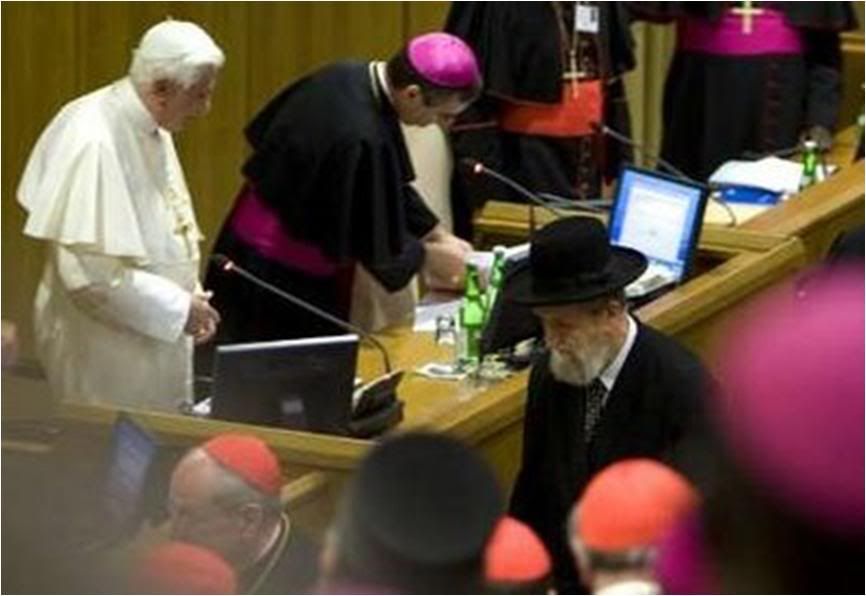 Pope Benedict and the Synod presidents rise as Rabbi Cohen makes his way to the podium.
Pope Benedict and the Synod presidents rise as Rabbi Cohen makes his way to the podium.
VATICAN CITY, Oct. 6 (Translated from SIR) - "My presence at the Synod is a sign of hope, a message of love, of coexistence and of peace for our generations, and for those of the future."
This was affirmed by the Chief Rabbi of Haifa, Shear-Yashuv Cohen, who addressed the second general congregation of the current General Assembly of the Bishops Synod this afternoon .
It was the first time that a non-Christian has addressed the Synodal fathers.
Rabbi Cohen situated his presence "in the wake of what John XXIII started and which reached its peak in the life and work of John Paul II".
Speaking of the role of Sacred Scriptures in the story and life of the Jewish people, the rabbi recalled that "they are at the center, even in the physical sense, of Jewish rites and in the life itself of Jewish persons. Children are introduced early to the study of Sacred Scriptures, which they often commit to memory".
Rabbi Cohen is one of three Synodal guests specially invited by Benedict XVI to address the Synod. The other two are A.Miller Milloy, secretary-general of the United Bible Societies; and Brother Alois, prior of the Community of Taize.
The rabbi's address was followed by that of Cardinal Albert VanHoye, who presented the document of the Pontifical Biblical Commission entitled "The Jewish people and Sacred Scriptures in the Christian Bible' which was published in 2001.
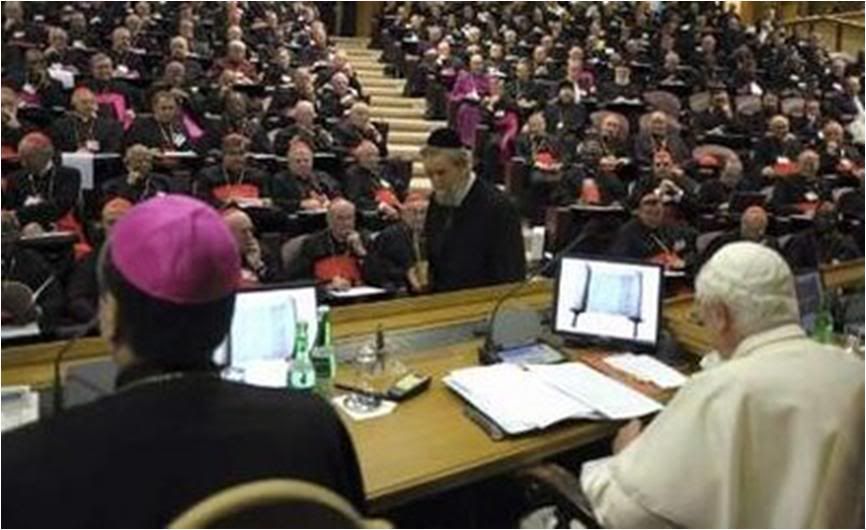 Rabbi condemns Iran president
Rabbi condemns Iran president
at Vatican Synod

VATICAN CITY, Oct. 6 (AP) - A top rabbi addressing a worldwide meeting of Roman Catholic bishops at the Vatican on Monday condemned the Iranian president's verbal attacks on Israel.
Shear-Yashuv Cohen, a chief rabbi in the Israeli city of Haifa, became the first Jew to address such a meeting, known as a synod of bishops.
In his speech Cohen did not name Iranian President Mahmoud Ahmadinejad but denounced "the terrible and vicious words" spoken by "the president of a certain state in the Middle East" at the U.N. General Assembly last month.
Ahmadinejad lashed out at Israel and accused "Zionists" of controlling the world's economy. The speech drew harsh condemnations by Israeli and Jewish leaders, and Cohen said the "false and malicious accusations" were an incitement to anti-Semitism.
Addressing the gathering of 253 bishops, the rabbi spoke of the "long, hard and painful history" of Jewish-Catholic relations, calling it "a history of blood and tears."
He called his appearance a signal of "hope and a message of love," noting efforts to improve relations that began under Pope John XXIII and that reached a climax under John Paul II.
He spoke of the meaning of the Bible to the Jewish people. The bishops are discussing the relevance of the Bible for contemporary Catholics.
Unfortunately, there is also this comparatively lengthy report today by Reuters that the Rabbi had second thoughts about his participation - and why. He appears to share the closed mind that many Jews have about Pope Pius XII.
Rabbi in Vatican says
wartime pope let Jews down
By Philip Pullella

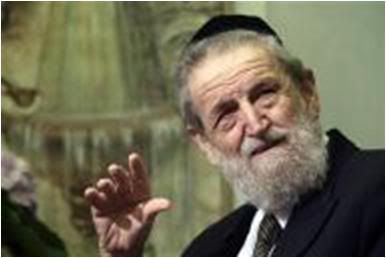
ROME, Oct. 6 (Reuters) - The first Jew to address a Vatican synod said on Monday that wartime Pope Pius XII should have done more to help Jews during the Holocaust.
Rabbi Shear-Yashuv Cohen told Reuters he might have stayed away if he had known the major Church gathering coincided with ceremonies to honor Pius on the 50th anniversary of his death.
"We feel that the late pope (Pius) should have spoken up much more strongly than he did," Cohen, 80, said in an interview hours before he was due to address the gathering of Catholic bishops from around the world.
Cohen said that in his speech he planned to make an indirect reference to Jewish disappointment about Pius as well as an appeal to all religious leaders to denounce Iranian President Mahmoud Ahmadinejad.
Last month Pope Benedict forcefully defended Pius, saying he "spared no effort" on behalf of Jews during World War II.
Some Jews maintain Pius did not do enough to save Jews while the Vatican says he worked behind the scenes to help because more direct intervention would have worsened the situation.
"He may have helped in secrecy many of the victims and many of the refugees but the question is 'could he have raised his voice and would it have helped or not?'" Cohen said.
"We, as the victims, feel yes. I am not empowered by the families of the millions of deceased to say 'we forget, we forgive,'" said Cohen, who is chief rabbi of Haifa in Israel.
Pius is one of the most difficult issues in Catholic-Jewish relations. On Thursday the Vatican marks the 50th anniversary of his death, Benedict celebrates a Mass in his memory and there will be a conference and photo show on his papacy next month.
"I did not know (the anniversary commemorations) happened during the same meeting. If I had known ... I might have refrained from coming because we feel that the pain is still here," Cohen said.
"I have to make it very clear that we, the rabbis, the leadership of the Jewish people, cannot as long as the survivors still feel painful agree that this leader of the Church in a time of crisis should be honored now. It is not our decision. It pains us. We are sorry it is being done," he said.
Cohen said only God knows if Pius spoke out enough against the Holocaust: "God is the judge ... he knows the truth."
Urged by historians to open up all its archives from World War II, the Vatican says some are closed for organizational reasons but that most of the significant documentation regarding Pius is already open to scholars.
Last year, the Vatican's saint-making department voted in favor of a decree recognizing Pius's "heroic virtues," a major hurdle in a long process toward possible sainthood that began in 1967. But Pope Benedict has so far not approved the decree. [Is this true? Benedict XVI has been referring to Pius XII as 'the servant of God', which is the honorific used by the Church after approval to proceed with the beatification process of a person proposed for beatification. I must check back on the announcement made by the Congregation for the Causes of Saints last year - they would not have announced it at all, if the Pope had not approved their decree of 'heroic virtues'.]
Some Jewish groups say the Vatican should freeze the process of beatification but others say it is an internal Church matter.
Cohen said he would also appeal to the synod to denounce Ahmadinejad, who made another virulent anti-Israel speech last month at the United Nations. He said he would "appeal to the leaders of religion not to keep quiet, not to stand aside."
"He says that he wants to annihilate Israel and destroy it. The problem in the days of the Second World War was that people didn't believe that what Adolf Hitler was saying, he really meant to fulfill.
"Unfortunately we had the Holocaust and I am sure that if we have a painful memory it is because we don't feel that enough was done by the leadership of the religions in the world and other powerful leaders to stop it at that time. We expect them to do it today," he said.
 THE POPE'S COURTESY
THE POPE'S COURTESY: He greets Rabbi Cohen on his arrival at the Synod Hall, and thanks him after his intervention.
I do not usually quibble much about the niceties of protocol, but I am certainly very disturbed by what seems to be Rabbi Cohen's questionable action of saying all this just before addressing the Synod, even if he did say he planned to make an indirect reference to Pius XII in his Synodal discourse. In fact, it goes to something more fundamental than protocol - it is a question of elementary courtesy to your host.
To make matters worse, he spoke to other newsmen after his intervention at the Synod to say the same things, according to this brief bulletin from

VATICAN CITY, Oct. 6 (Translated from APcom) - The chief Rabbi of Haifa, a guest at the General Assembly of the Bishops Synod which began today at the Vatican, asks that Pope Pius XII should not be beaitified because of his 'silence' about the Holocaust.
Shear Yashuv Cohen spoke with a group of journalists after his late afternoon address to the Synod.
The rabbi is certainly entitled to his opinion, but it one thing to voice the thinking of many Jews that Pius XII was remiss, to say the least, in not speaking out against the Holocaust, and yet another to 'ask that he should not be beatified'.
Beatification is an internal matter for the Catholic Church - it has nothing to do with what other religions think one way or the other about the candidate, and it is highly improper for the leaders of other religions to 'interfere' in the process this way.
Moreover, Rabbi Cohen's arguments against Pius XII have been amply answered in a mountain of documentation including recent books by Jewish authors.
The answer is very simple to his question: If Pius XII would have spoken out about the Holocaust during the war, would it have helped? NO!
The Nazis were already very hostile to him, and they had even plotted to kidnap him, among other things. For him to have 'spoken out' then would simply have invited reprisals on both Jewish and Christians.
And why is Pius XII singled out for 'not speaking' during the war? Name one important voice who spoke out about it at the time! Not even Churchill or Roosevelt, who must have been aware of what was happening even if the actual proportions were not widely appreciated, but their priority was to defeat Hitler first. No one has disputed that priority, not even the Jews.
People will forever debate whether prudence is the better part of valor in matters like this, but in the case of Pius XII, the number of Jews he actually saved, directly or indirectly - more than those saved by Oskar Schindler, by most accounts - more than makes up for that prudence.
In fact, by Jewish standards, Pius XII deserves a place in their list of the "Righteous among Nations' that they honor at Yad Vashem, the Holocaust Memorial in Jerusalem, which defines the 'righteous' as 'people to pay tribute to people who stood by their side at a time of persecution and great tragedy'.
The Jews have a beautiful saying - that I must look up - about the inestimable value of any person saving one Jewish life. Pius XII saved thousands. Why does that count for nothing in this irrational mania to find grievous fault in him?
[Modificato da TERESA BENEDETTA 06/10/2008 23:52] |
 06/10/2008 20:07 06/10/2008 20:07 |
|
| | | OFFLINE | | Post: 90 | Registrato il: 16/07/2007
| Utente Junior | |
|
The point Rabbi Cohen makes is a good one: "He may have helped in secrecy many of the victims and many of the refugees but the question is 'could he have raised his voice and would it have helped or not?'" I know the "Pave the Way" foundation has honored Pius XII for what he did, but I've always wondered what difference it would have made had Pius XI been Pope during WWII and not Pius XII. Pius XI was known for his brusqueness and impatience with diplomatic niceties. He was the one who issued Mit brennender Sorge, which he caused to be read from every pulpit in Germany. He also said: "Spiritually, we are Semites," which made the link between Catholics and Jews obvious.
I guess people can argue forever about whether Pius XII did "enough," but the question of secrecy is pertinent and appropriate. If he had put Germany under an interdict or excommunicated anyone who cooperated with the Naziis, things might have turned out differently. Or not. But at least it would have been public. |
 06/10/2008 20:08 06/10/2008 20:08 |
|
| | | OFFLINE | | Post: 15.224 | Registrato il: 28/08/2005
| Utente Gold | |
|
 Normally, I would have posted this in REFLECTIONS ON OUR FAITH... but I chose to post it here because it is very pertinent to the topic of the current Synodal assembly.
Defending the Bible readings
Normally, I would have posted this in REFLECTIONS ON OUR FAITH... but I chose to post it here because it is very pertinent to the topic of the current Synodal assembly.
Defending the Bible readings
in the traditional Mass against
two theories born of Biblicism
by Fr. Nicola Bux and Fr. Salvatore Vitiello
Translated from

Some say that the post-Conciliar Mass is richer in Readings and Eucharistic Prayers, while the so-called Pius V Missal [basis of the 1962 John XXIII Missal] is be poorer and less accurate.
This theory is anachronistic since it fails to consider four centuries of distance; it is as if we were to say the same thing of "Sacramentaries" written centuries before the Pius V Missal.
Moreover, it overlooks the fact that the pericopes (Bible extracts) in the Pius V Missal were based on old capitularies containing Biblical epistles, such as St Jerome's Liber comitis from 471 - or on Gospel pericopes traditionally found in liturgies of the Oriental Churches and in Byzantine liturgy today.
Second, the brief readings recall the essential in the excerpt chosen, expressing the moderation characteristic of the Roman Rite.
Some have even said that the Extraordinary Form of the single Latin Rite gives too little emphasis to the presence of Christ in the Word, as proclaimed in the assembly, and thus, the liturgy loses the very essence of the 'two tables' referred to in Dei Verbum (No. 21). But Dei Verbum makes it clear that the 'two tables' [the table of the Word and theh table of the Eucharist] form one act of worship!
Critics also say that the Missal that followed the Council of Trent strays far from the tradition of the Church Fathers; that the Missal was planned for the priest only, not for the participation of the assembly, which is considered irrelevant.
In fact, they say, it is as if the priest celebrates on his own, and so does the congregation. And that in contrast, in the Mass of Paul it is not the priest who celebrates but the Church, sacramentally present in the assembly, of which the priest, by reason of order, is the natural president.
This position is rather problematic because it reduces everything to the 'Word' and the 'Assembly' of the faithful.
However, “Jesus is not just the teacher, but also the redeemer of the whole person. The Jesus who teaches is, at the same time, the One who saves” (J.Ratzinger-Benedict XVI, Gesù di Nazaret, p. 65), which is effectively shown in the entirety of the Eucharistic Sacrifice.
Another theory, which has become widespread due to the customary phenomenon of substitution (exchanging one thing with another), is to make the presence of Jesus Christ in the Blessed Sacrament equivalent to the presence of the Word in the Book of Scriptures. But the latter 'presence' is acknowledged only “when the Holy Scriptures are read in the Church” (Sacrosanctum Concilium n. 7).
It is necessary to reaffirm that Christ's presence in the Word exists on two conditions: when it is read out “in the Church assembly”, not privately, and when Sacred Scripture is 'read'. The Holy Book placed on the lectern or the altar is not alone indicative of this presence [in the sense that Christ is truly present in the Eucharist].
Finally, it is more than ever urgent that preaching and catechesis return to making the proper distinction between Revelation, Word of God, and Sacred Scripture which, although closely connected, are not equivalent.
In fact, not surprisingly, we see considerable confusion about this, not only among the lay faithful.
Some priests even think that the Bible is to be interpreted 'with the Bible alone' and not, as the Catholic Church has always held, together with Tradition and by faithful listening to the Magisterium.
|
|
|
|
|